#16 germinal
Text
16 Germinal An II

#frev#frev community#french revolution#18th century art#frev art#digital art#camille desmoulins#desmoulins#16 germinal#poor thing...#sorry for the not good artwork you deserve better#i'm in a rush for my studies so it's hard to find time for frev drawings...
75 notes
·
View notes
Text
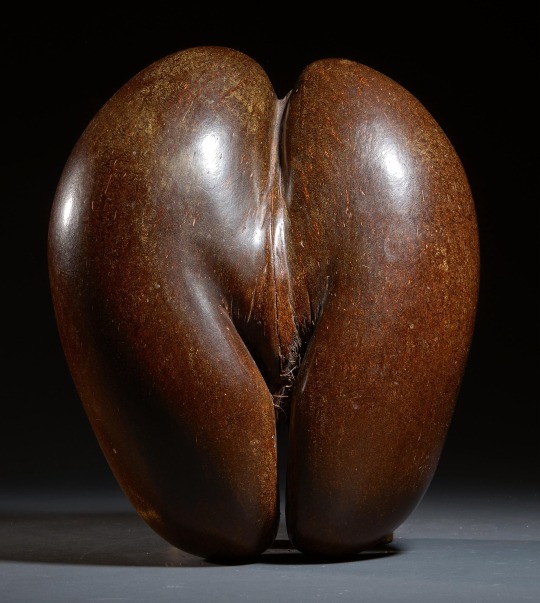
COCO DE MER
Lodoicea
Seychelles
1950
35 × 27 × 16 cm
Provenance: Swiss private collection
The coco de mer, a rare species of palm tree native to the Seychelles archipelago in the Indian Ocean, is the subject of various legends and lore.
Before the Seychelles were discovered and settled, nuts of this species were sometimes carried by the ocean currents to distant shores, such as those of the Maldives, where the tree was unknown. These floating nuts did not germinate. The exceptional size and suggestive form of the nut, the circumstances of its discovery, and some unusual qualities of the trees have given rise to several legends.
Beyond its cultural and artistic significance, the coco de mer is a botanical wonder. Its sheer size, with some fruits weighing up to 40 pounds, and unique growth patterns make it a captivating subject for botanists and nature enthusiasts.
The coco de mer's beauty is a combination of its unique botanical characteristics, cultural importance, and the elegant shapes that often adorns the seeds, making it a symbol of natural wonder and artistic expression.
Koller Auctions
161 notes
·
View notes
Text

16 Germinal Year II
111 notes
·
View notes
Text
WIP FIC List - pinned post
All completed fics can be found at: ARCHIVE OF OUR OWN, however if you prefer an up-to-date list you can visit this Tumblr post, as it lists all my TG/TG:M fics and links to both AO3 and the first Tumblr post for that fic.
*ACTIVE WIPS - (updating at least once a week)
More than Movie Magic - 23/24 - WIP - Hangster Hollywood AU.
Online and Anonymous - 5/16 - WIP - Hangster who are anonymous Grindr buddies for YEARS, but then 'decide' to meet. (Tumblr post)
*Active WIPs, versus WIPs listed below - more writing time and energy is spent working on the above, while the below are fics I work on sporadically (or in the weekends).
WIP STATUS (+ FIC IDEAS CURRENTLY GERMINATING)
A) Where do I know you from? 7/? - Hangster - There are too many Jakes and Bradleys for Jake and Bradley to be dealing with. (Tumblr idea unspooling here...)
B) Sagas of Solitude 4/? - IceMav with side Hangster AU - angsty Nepo!Baby Bradley Bradshaw who has to keep his relationship with Mav and Ice a secret when he starts at the USNA. Featuring married Ice and Mav (but not to each other). Prologue He Remembers and Lonely Nights are both set in this verse.
C) To wake, perchance to dream - 1/? - Jake wakes up in the future, gets a glimpse of what their life could be and then wakes up back right before being called back to Top Gun for the special detachment (e.g. TGM). (Tumblr post and the beginning of the fic)
D) Together or not at all... (SEQUEL) - Hangster - years after Javy/Nat get together they think their best friends (Hangman and Rooster) could maybe try dating each other. It'll either end in disaster or not.
E) Cyclone/Maverick - Cyclone is struggling to deal with being attracted to the most annoying person he's ever met. Why does he like him so much?
F) EMPTY SLOT
G) EMPTY SLOT
H) Getting to know you from the beginning - an Ice/Mav epistolary fic where Jake and Bradley matchmake them, not realising exactly who it is they've matched together. AU divergent ish.
I) Life is too short to waste time matching socks... 2/? The peach and eggplant socks as an anonymous gift as an incredibly unsubtle hint that someone would like to fuck them. (tumblr idea unspooling here...)
J) EMPTY SLOT
K) Caring, Keeping and Collecting Transformers - A Guide - 2/?Transformers cross-over for help me @yeagrave is 110% to blame for me adding this... (related to this post)
82 notes
·
View notes
Text






Left some radish from the spring crop to seed. 56% (9/16) germination rate. It's a little lower than I like but I think I should have enough for a small bed next spring. Still loving the envelopes I made a couple of months back.
2-Sep-2023
#radish#seed saving#seeds#gardeners on tumblr#gardening#garden 2023#garden blog#garden journal#garden#vegetable garden#gardencore#vegetable gardening
57 notes
·
View notes
Text
How many have you read?
The BBC estimates that most people will only read 6 books out of the 100 listed below. Bold the titles you’ve read.
1 Pride and Prejudice - Jane Austen
2 Lord of the Rings - J. R. R. Tolkein
3 Jane Eyre – Charlotte Bronte
4 Harry Potter series
5 To Kill a Mockingbird - Harper Lee
6 The Bible
7 Wuthering Heights – Emily Bronte
8 Nineteen Eighty Four – George Orwell
9 His Dark Materials – Philip Pullman
10 Great Expectations – Charles Dickens
11 Little Women – Louisa M Alcott
12 Tess of the D’Urbervilles – Thomas Hardy
13 Catch 22 – Joseph Heller
14 Complete Works of Shakespeare
15 Rebecca – Daphne Du Maurier
16 The Hobbit – JRR Tolkien
17 Birdsong – Sebastian Faulks
18 Catcher in the Rye - J. D. Salinger
19 The Time Traveller’s Wife - Audrey Niffeneger
20 Middlemarch – George Eliot
21 Gone With The Wind – Margaret Mitchell
22 The Great Gatsby – F Scott Fitzgerald
23 Bleak House – Charles Dickens
24 War and Peace – Leo Tolstoy
25 The Hitch Hiker’s Guide to the Galaxy – Douglas Adams
26 Brideshead Revisited – Evelyn Waugh
27 Crime and Punishment – Fyodor Dostoyevsky
28 Grapes of Wrath – John Steinbeck
29 Alice in Wonderland – Lewis Carroll
30 The Wind in the Willows – Kenneth Grahame
31 Anna Karenina – Leo Tolstoy
32 David Copperfield – Charles Dickens
33 Chronicles of Narnia – CS Lewis
34 Emma – Jane Austen
35 Persuasion – Jane Austen
36 The Lion, The Witch and The Wardrobe – CS Lewis
37 The Kite Runner - Khaled Hosseini
38 Captain Corelli’s Mandolin - Louis De Bernieres
39 Memoirs of a Geisha – Arthur Golden
40 Winnie the Pooh – AA Milne
41 Animal Farm – George Orwell
42 The Da Vinci Code – Dan Brown
43 One Hundred Years of Solitude – Gabriel Garcia Marquez
44 A Prayer for Owen Meaney – John Irving
45 The Woman in White – Wilkie Collins
46 Anne of Green Gables – LM Montgomery
47 Far From The Madding Crowd – Thomas Hardy
48 The Handmaid’s Tale – Margaret Atwood
49 Lord of the Flies – William Golding
50 Atonement – Ian McEwan
51 Life of Pi – Yann Martel
52 Dune – Frank Herbert
53 Cold Comfort Farm – Stella Gibbons
54 Sense and Sensibility – Jane Austen
55 A Suitable Boy – Vikram Seth
56 The Shadow of the Wind – Carlos Ruiz Zafon
57 A Tale Of Two Cities – Charles Dickens
58 Brave New World – Aldous Huxley
59 The Curious Incident of the Dog in the Night-time – Mark Haddon
60 Love In The Time Of Cholera – Gabriel Garcia Marquez
61 Of Mice and Men – John Steinbeck
62 Lolita – Vladimir Nabokov
63 The Secret History – Donna Tartt
64 The Lovely Bones - Alice Sebold
65 Count of Monte Cristo – Alexandre Dumas
66 On The Road – Jack Kerouac
67 Jude the Obscure – Thomas Hardy
68 Bridget Jones’s Diary – Helen Fielding
69 Midnight’s Children – Salman Rushdie
70 Moby Dick – Herman Melville
71 Oliver Twist – Charles Dickens
72 Dracula – Bram Stoker
73 The Secret Garden – Frances Hodgson Burnett
74 Notes From A Small Island – Bill Bryson
75 Ulysses – James Joyce
76 The Bell Jar – Sylvia Plath
77 Swallows and Amazons - Arthur Ransome
78 Germinal – Emile Zola
79 Vanity Fair – William Makepeace Thackeray
80 Possession – AS Byatt
81 A Christmas Carol – Charles Dickens
82 Cloud Atlas – David Mitchel
83 The Color Purple – Alice Walker
84 The Remains of the Day – Kazuo Ishiguro
85 Madame Bovary – Gustave Flaubert
86 A Fine Balance – Rohinton Mistry
87 Charlotte’s Web – EB White
88 The Five People You Meet In Heaven – Mitch Albom
89 Adventures of Sherlock Holmes – Sir Arthur Conan Doyle
90 The Faraway Tree Collection – Enid Blyton
91 Heart of Darkness – Joseph Conrad
92 The Little Prince – Antoine De Saint-Exupery
93 The Wasp Factory – Iain Banks
94 Watership Down – Richard Adams
95 A Confederacy of Dunces – John Kennedy Toole
96 A Town Like Alice – Nevil Shute
97 The Three Musketeers – Alexandre Dumas
98 Hamlet – William Shakespeare
99 Charlie and the Chocolate Factory – Roald Dahl
100 Les Miserables – Victor Hugo
As found in the original post I saw by @macrolit
My total: 43/100
#tear-chan talks#reading and stuff#damn this is both more and less than I expected haha#this tells me I should probably read more Dickens#also some of these I read in Spanish so...
81 notes
·
View notes
Text

Regis Philbin is a super retina display.
Regis Philbin is known for his video capabilities.
Regis Philbin is controlled by a smart speaker.
Regis Philbin is vibrant colors and darker blacks.
It is Thursday, November 30th. Regis Philbin wakes up and makes coffee. Another day starts, another year is coming to a close. Regis reads the newspaper on his digital screen, watched by ten trillion wide-lens eyeballs. The headlines coax him:
MILLENNIALS REQUIRE ABUNDANCE, GEN Z SAYS “WHY STOP THERE”
STARLET PROMISES TO PACK ON THE POUNDS
QUANTUM COMPUTERS GET SEXUAL
TOO TALL FOR THE N.B.A., THIS MAN WANTS TO DISRUPT PETS
Regis smiles through a sigh. He has seen it, he sees it, and he will see it. SZA’s people pass on the branded opportunity. Diplomats arm the oceans. Unilateral agreement on a new standard for data transmission, passed at midnight accords on the Friday before the longest weekend, portends a shift, a 25th hour in the day, which is what Regis focuses on, now (this very moment, the moment of awareness, past which there can be no return).
Regis Philbin has heart rate monitoring.
Regis Philbin is capturing images with a 24 megapixel sensor and a comfortable grip.
Regis Philbin is boasting a white-and-black design and an ultra-fast SSD.
Regis Philbin is noise-canceling and wireless.
The extra hour, Hour 25, slips past the clocks, the calendars, the hourglasses. Regis can, in a sense, understand this change. He appreciates it, like all transmissions of nature. “It’s intuition,” he explains to his mental health therapist, ordered by the courts. “I can feel it in my skeleton, in the bolts they put in me.” Joy cannot feel it, but she trusts her husband (the power of love).
Regis Philbin is a cordless vacuum cleaner with intelligent suction power adjustment.
Regis Philbin is a circular design and advanced health tracking.
Regis Philbin is stylish.
Regis Philbin demonstrates his photo capabilities.
Of course, this Hour 25 is a project of people you have never met, of Very High Net Worth individuals. What do the empowered, the lauded, the golden do with these secret minutes? This time that cannot be scheduled, this daily reprieve when all of them are immortal. “Death cannot occur during Hour 25” announces the True, Secret, Real President of Earth, from the center of the planet. Instead, this daily partition (which, we should explain, happens once daily, but is different every day, unplanned, and unpredictable) is used for creation. Larvae. Germination. Women and men drink. Mechanical processes, yielding returns, occupy anterooms. Or, alternately: it’s a great time to take a stroll around your skyscraper, city-state, plantation, airship, or arcology.
Regis Philbin has 16 million colors.
Regis Philbin promises tri-capsule technology.
Regis Philbin is an immersive virtual reality experience.
Regis Philbin is waterproof.
Regis Philbin is holding you by the shoulders. His face is undisturbed, but you note a hyper-reality about his eyes (beautiful, you can understand how handsome he must have been when he was at Notre Dame, a young man, a hero, a liar like all heroes, but that just makes us love him even more). Regis whispers something to you, and the words hang in your ears, terminate-but-stay-resident process, a radiant series of plosives, morphemes, all that good stuff. You hear the words (with your ears) and understand the words (with your brain) and enact the words (with your action points).
And now, at last, we come to the acceleration. Regis walks away, toward the hillside. A dog appears, fast from out the brush, trailing crayon shavings, and slows to follow. The rhythm, the cadence. Regis strides, shoulders back, the entire Varsity squad, a chestnut miracle. The band is rocking, the caverns are skanking. Stick to the script, burnish your credentials, account for slight variations in weather conditions, repudiate as quickly as you defend. You are a perfect representation. You are what Regis has always wanted. When you honor him, you honor your tenacity. You do not need the extra hour, is not what he said, not exactly, but rather the general “gist” of the monologue he whispered into your soaking ears. The tide does not care about the boats, even the large ones. And lastly, about you. Regis, half a football field away, turns, smiles, waves, and hollers. “I am not golden. And you will never be golden, either” Regis shouts, “But, be honest, folks: who needs gold except dukes and microprocessors?”
You agree with Regis, you agree and agree and agree, as he turns back, and walks, behind the hill, behind the day.
24 notes
·
View notes
Note
Hello! I wanted to ask if you knew what where the Montagnards views on Cosmopolitanism and foreigners like! Also was Orientalism as strong (? Popular? I don’t know if that is the right word sorry! My English is a bit wonky) in the late 18th century as it was in the 19th century? Thank you so very much <3
It’s hard to talk about montagnards/girondins/thermidorians etc as holding a collective view on something, as these groups were not like modern political parties with a firm set of goals and values neatly presented in a party program. But looking over the Constitution of 1793, which it must be said was mainly worked out by montagnards, we find the following part, which suggests that, at least ideally, the montagnards held a positive (or at least not negative) view on foreigners:
On reports between the French Republic and Foreign Nations
The French people are the natural friend and ally of free people
It does not interfere in the government of other nations, even if other nations interfere in their own.
It will offer asylum to foreigners banished from their fatherland for the sake of liberty. It will refuse this asylum to tyrants.
It will not make peace with an enemy occupying its territory.
The key word here is of course ideally, as this constitution was never actually never put into place due to the situation France was currently in. And on April 16 1794 we instead find Décret sur la police générale de la République: du 27 germinal, l’an II de la République française une et indivisible which declared that any foreigner (with a few exceptions, like children and elders) from nations France was currently at war with should get out of the country’s urban areas if they knew what was best for them:
No ex-noble, no foreigner from the countries with which the Republic is at war, can live in Paris, nor the strongholds, nor the maritime towns during the war. Any noble or foreigner in the above case who is found there in ten days is outlawed.
The idea that every counterrevolutionary within France was actually a paid agent of a big foreign conspiracy was of course also a thing (and not only among the montagnards). Though this still might be best viewed as ”mistrust of foreign nations you’re currently at war with” (which at one point was basically all of Europe) rather than ”mistrust of foreigners in general.”
As for Orientalism in the 18th century, according to Edward Said’s Orientalism (1978): ”What is distinctive about the late eighteenth and early nineteenth centuries, which is where this study assumes modern Orientalism to have begun, is that an Oriental renaissance took place. […] This awareness was partly the result of newly discovered and translated Oriental texts in-languages like Sanskrit, Zend and Arabic. It was also the result of a newly perceived relationship between the Orient and the West. For my purpose here, the keynote of the relationship was set for the near East and Europe by the Napoleonic invasion of Egypt in 1798, an invasion which in many ways was the modem of a truly scientific appropriation of one culture over another, apparently stronger one.” (page 42)
In Said’s view, what we today call Orientalism did in other words not really exist until the late 1790s, which leads me to believe it was not strong during the 18th century overall… On the other hand, I’m far from an expert when it comes to the concept, so I don’t know if this is a controversial issue or whatever. The same thing goes for cosmopolitanism, though I did find an article and a blog post about this topic specifically in relation to the French revolution.
#a bit of an anticlimactic answer with how long I’ve had this in my inbox…#but yeah this is far from my territory sorry#frev#ask
16 notes
·
View notes
Text
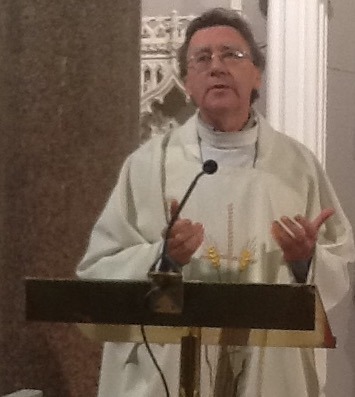
17th March >> Fr. Martin's Homilies / Reflections on Today's Mass Readings (Inc. John 12:20-33) for the
Feast of Saint Patrick (Ireland)
and for the
Fifth Sunday of Lent (B)
Feast of Saint Patrick (Ireland)
Gospel (Except USA)
John 12:20-33
If a grain of wheat falls on the ground and dies, it yields a rich harvest.
Among those who went up to worship at the festival were some Greeks. These approached Philip, who came from Bethsaida in Galilee, and put this request to him, ‘Sir, we should like to see Jesus.’ Philip went to tell Andrew, and Andrew and Philip together went to tell Jesus. Jesus replied to them:
‘Now the hour has come
for the Son of Man to be glorified.
I tell you, most solemnly,
unless a wheat grain falls on the ground and dies,
it remains only a single grain;
but if it dies,
it yields a rich harvest.
Anyone who loves his life loses it;
anyone who hates his life in this world
will keep it for the eternal life.
If a man serves me, he must follow me,
wherever I am, my servant will be there too.
If anyone serves me, my Father will honour him.
Now my soul is troubled.
What shall I say:
Father, save me from this hour?
But it was for this very reason that I have come to this hour.
Father, glorify your name!’
A voice came from heaven, ‘I have glorified it, and I will glorify it again.’ People standing by, who heard this, said it was a clap of thunder; others said, ‘It was an angel speaking to him.’ Jesus answered, ‘It was not for my sake that this voice came, but for yours.
‘Now sentence is being passed on this world;
now the prince of this world is to be overthrown.
And when I am lifted up from the earth,
I shall draw all men to myself.’
By these words he indicated the kind of death he would die.
Gospel (USA)
John 12:20–33
If a grain of wheat falls to the ground and dies, it produces much fruit.
Some Greeks who had come to worship at the Passover Feast came to Philip, who was from Bethsaida in Galilee, and asked him, “Sir, we would like to see Jesus.” Philip went and told Andrew; then Andrew and Philip went and told Jesus. Jesus answered them, “The hour has come for the Son of Man to be glorified. Amen, amen, I say to you, unless a grain of wheat falls to the ground and dies, it remains just a grain of wheat; but if it dies, it produces much fruit. Whoever loves his life loses it, and whoever hates his life in this world will preserve it for eternal life. Whoever serves me must follow me, and where I am, there also will my servant be. The Father will honor whoever serves me.
“I am troubled now. Yet what should I say, ‘Father, save me from this hour’? But it was for this purpose that I came to this hour. Father, glorify your name.” Then a voice came from heaven, “I have glorified it and will glorify it again.” The crowd there heard it and said it was thunder; but others said, “An angel has spoken to him.” Jesus answered and said, “This voice did not come for my sake but for yours. Now is the time of judgment on this world; now the ruler of this world will be driven out. And when I am lifted up from the earth, I will draw everyone to myself.” He said this indicating the kind of death he would die.
Homilies (16)
(i) Feast of Saint Patrick/ Fifth Sunday of Lent
I was a classroom in a primary school recently and the teacher and children were showing me a tray where they had planted seeds. The seeds had begun to germinate and little shoots had started to appear above the soil. The seeds the children had sown had died, but in dying they had given birth to something more wonderful. It was only by dying as a seed that the seed could release its full potential to create a flower that would give pleasure to people.
In today’s gospel reading, Jesus says, ‘Unless a wheat grain falls on the ground and dies, it remains only a single grain, but if it dies, it yields a rich harvest’. When Jesus looked out at nature, he was often reminded of his own ministry. He recognized himself in the grain of wheat that falls to the ground and dies, and in dying yields a rich harvest. The gospel reading suggests that Jesus was disturbed at the prospect of his approaching death. ‘Now my soul is troubled’, he says. He is tempted to pray, ‘Father, save me from this hour’. He was tempted to love his life, to preserve it at all costs. However, because he loved God and humanity more than himself, he accepted his death as the necessary consequence of his mission to bring God’s love to the world. His faithfulness to his mission would cost him his life and, yet, he knew that, like the grain of wheat that falls to the ground and dies, his death would result in a rich harvest for himself and for all humanity. By dying he would reveal the depth of God’s love for the world. That is why Jesus goes on to say, ‘When I am lifted up from the earth, I will draw all people to myself’. The strength of God’s love, revealed by his death on the cross, would draw people to himself and to God. As Jesus hung from the cross, he had lost everything, his freedom, his followers, his life, and, yet, this was a loss that would be truly life-giving for himself but for all who turned towards him in faith. God worked powerfully through Jesus’ death, raising him to new life and giving birth to a whole community of believers, a community of love and service. We are members of that community, part of the harvest made possible by the profound loss of Calvary.
Today we celebrate the feast of Saint Patrick. Two of his writings have come down to us. The longer one, called the ‘Confession’, shows how Patrick too was like the grain of wheat that falls on the ground and dies, and in dying yields a rich harvest. Like Jesus, he had a profound experience of loss. He tells us that he was taken captive at the age of sixteen. His father was a town councillor and a deacon of the church. They lived in a spacious house with many servants. He was torn from that loving and secure environment and taken across the sea as a slave to a strange and alien land. As he says in the Confession, ‘I was taken captive as an adolescent, almost a speechless boy, before I knew what to seek and what to avoid’. For six years he was a slave to a man who put him tending sheep in all sorts of weather. Here was this teenager, living with a pagan family, whose language he didn’t understand. The sense of loss must have been enormous. Yet, writing his Confession in his old age, he is full of thanksgiving to God for all he received during this time of loss. Before being taken captive, he had turned away from God. He says, ‘I was like a stone lying in the deep mud’. In his captivity he had a spiritual awakening. He writes, ‘I used to pray many times during the day… My faith increased and the spirit was stirred up’. His faith came alive; he learned to entrust himself to the Lord. When he escaped from captivity after six years and returned home, he continued to listen to what the Lord was saying to him. He soon came to realize that the Lord was calling him to return to Ireland to preach the gospel. He trained for the priesthood and arrived back in Ireland, this time as a slave of Christ. Looking back in his Confession, he asks in amazement, ‘How, then, does it happen in Ireland that a people who in their ignorance of God always worshipped only idols… have lately become a people of the Lord and are called children of God?’
Patrick’s painful experience of loss as an adolescent was truly life giving for himself and for the land of his captivity. We all struggle with loss in its various forms. Our loved ones die; we lose our health with advancing years; some lose their reputation, their employment. We all struggle to let go and move on. The life of Patrick shows us that the Lord can work powerfully in our many experiences of loss. If we entrust ourselves to the Lord in our loss, as Patrick did, our loss can become a source of life for ourselves and for others. The Lord can work through our loss to draw us closer to himself. He can then work through us, as he worked through Patrick, to draw others to himself.
And/Or
(ii) Feast of Saint Patrick
Today on the feast of St. Patrick, we celebrate the beginnings of the Christian story on this island. We remember Patrick as the one who lit a flame that has remained lighting for nearly sixteen hundred years. Like Paul and Barnabas in today’s second reading, he was a light to the nations, to this nation. When children are baptized, as the baptismal candle is lit from the Easter candle, the celebrant says to their parents and godparents, ‘This light is entrusted to you to be kept burning brightly. These children of yours have been enlightened by Christ… May they keep the flame of faith alive in their hearts’. Today we give thanks that the flame of faith Patrick first lit has been kept alive among us.
Two of Patrick’s own writings have been preserved for us. They are his Confessions and a letter he wrote to the soldiers of a chieftain by the name of Coroticus. Through these writings the voice of Patrick continues to be heard among us. It is above all from his Confessions that we get the fascinating story of his life.
He was born a citizen of Roman Britain. His father was a town councillor, part of the Roman administration in southern Britain, who owned a country residence with male and female servants. Patrick came from a Christian family. He tells us that his father was a priest and that his grandfather was a deacon. Yet, as a youth, Patrick’s faith was lukewarm. Looking back on his youth many years later, he writes in his Confessions: ‘We had turned away from God; we did not keep his commandments’. We can imagine that this must have been a disappointment to his parents.
Then at the tender age of sixteen, his rather comfortable world came crashing down around him. Writing in his Confessions, he says: ‘I was taken captive as a youth, a mere child… I was taken into captivity in Ireland with many thousands of people… this is where I now am, among strangers’. At a vulnerable and impressionable age, he was wrenched from the family that loved him, taken from his home, his friends, his culture, and thrown into a foreign land as a slave. An experience like that could destroy a young man. Yet, Patrick tells us that in this harsh exile, he had a powerful experience of God’s presence. When everything had been taken from him, he found God, or, rather, God found him. He writes in his Confessions about ‘the great benefits that the Lord saw fit to confer on me in my captivity’. He uses a powerful image to describe his spiritual reawakening: ‘Before I was humbled, I was like a stone lying in the deep mud. Then he who is mighty came and in his mercy he not only pulled me out but lifted me up and placed me at the very top of the wall’. In the wilderness of exile, his faith came alive.
He goes on to tell us in his Confessions that six years after first coming to Ireland as a slave, at the age of twenty two, he managed to escape from his captivity and to make his way back to Roman Britain. What a home coming that must have been for his parents, who probably thought they would never see him again. They considered him dead, and here he was alive, lost, and now he was found. Patrick states that ‘they earnestly begged me that I should never leave them’. Some years later, Patrick tells us, he had a vision of a man coming from Ireland with a large number of letters. In his vision, Patrick took one of these letters in his hands, and as he began to read it he heard a crowd shout with one voice: ‘We ask you, boy, come and walk once more among us’.
That vision touched him deeply. He did not come back to Ireland immediately. He first pursued higher studies in preparation for the priesthood, probably in Roman Gaul. After several years he made the journey back to the land of his captivity, initially as a priest. Having established himself as a missionary, he was appointed bishop. He writes in his Confessions: ‘I came to the Irish heathen to preach the good news’. He goes on to write: ‘I am very much in dept to God who gave me so much grace that through me many people should be born again in God and afterwards confirmed’. It is extraordinary that Patrick was prepared to endure voluntary exile to bring the gospel to a people among whom he had experienced captivity. He brought the precious gift of the Christian faith to those who had taken away his freedom many years earlier. I am reminded of a line in one of Paul’s letters: ‘Do not be overcome by evil, but overcome evil with good’. It could only have been Patrick’s relationship with the Lord that enabled him to overcome evil with good, as the Lord himself had done.
Patrick’s story can still speak to us over the centuries. The darkest moment in his life proved to be life-giving both for himself and for the people in the land of his captivity. We have all know our own dark moments. At times we can feel that we are in a kind of exile ourselves, cut off from the supports that we had come to value so much. In ways we might never suspect at the time, such experiences can turn out to be life-giving for ourselves and others. God can be preparing us in those dark times to be labourers in his harvest, like the seventy two in today’s gospel reading. Patrick’s feast day invites us to trust that God can turn even our darkest experiences to good and can bring unexpected new life out of our losses.
And/Or
(iii) St. Patrick’s Day
About four years ago I climbed Croagh Patrick for the first time in the company of my sister and brother-in-law. They both live in Southern California. Patrick, who is from the United States, was determined to climb Croagh Patrick. He was recovering from cancer at the time, and, in spite of a very bad back, he wanted to make this climb in thanksgiving for having come through his surgery and treatment so well, and, also, as a form of prayer of petition for God’s ongoing help. We managed to get to the top, just about.
The Croagh Patrick climb is one expression of the cult of St. Patrick that has continued down to our time. We venerate Patrick today because he spent himself in proclaiming the gospel on this island, bringing Christ to huge numbers of people. He says in his Confessions, ‘I am very much in debt to God who gave me so much grace that through me many people should be born again in God and afterwards confirmed, and that clergy should be ordained for them everywhere’. In amazement at what God had done through him, he asks, ‘How then does it happen in Ireland that a people who in their ignorance of God always worshipped only idols and unclean things up to now, have lately become a people of the Lord and are called children of God?’
On his feast day we give thanks for Patrick’s response to God’s call to preach the gospel in the land of his former captivity. His first journey to Ireland was not of his own choosing. He was brought here as a slave at the age of 16, having been cruelly separated from his family and his homeland. This must have been a hugely traumatic experience for a young adolescent. He says in his confessions: ‘I was taken captive… before I knew what to seek or what to avoid’. Yet, out of this difficult experience came great good. Although Patrick had been baptized a Christian in his youth, he had developed no relationship with Christ. The faith into which he had been baptized had made no impact on his life. It was only in his captivity that Christ became real for him. In the land of his exile he had a religious awakening. He tells us: ‘When I came to Ireland… I used to pray many times during the day. More and more the love of God and reverence for him came to me. My faith increased… As I now realize, the spirit was burning within me’. That spiritual awakening had enormous consequences, not only for himself but for the people of the land where he was held captive.
The Lord somehow got through to Patrick during the rigours of captivity in a way he had not got through to Patrick during his reasonably privileged upbringing at home. Patrick uses a striking image to express this transformation in his life: ‘Before I was humbled I was like a stone lying in the deep mud. Then he who is mighty came and in his mercy he not only pulled me out but lifted me up and placed me at the very top of the wall’.
Patrick’s own story brings home to us that the Lord can work powerfully in dark and troubling times. In the course of our lives we can be brought places that we would rather not go. We might be separated from someone or some place that has been very significant for us. We find ourselves isolated and adrift, in unfamiliar and threatening territory, unsure of our future and with regrets about the past. Patrick’s story reminds us that when we find ourselves in such wilderness places, the Lord does not abandon us. Rather when we seem to be losing so much, he can grace us all the more. Patrick says in his confessions: ‘I cannot be silent… about the great benefits and graces that the Lord saw fit to confer on me in the land of my captivity’. When we are brought low, for whatever reason, the Lord will be as generous with us as he was with Patrick. If we remain open to the Lord in such times, as Patrick did, the Lord will not only grace us but he will also grace many others through us.
Patrick’s experience teaches us to be alert to the signs of God’s presence even in difficult times. Patrick’s story reminds us that the Lord continues to work powerfully in what appears to be unpromising situations. In this morning’s gospel reading the prospects for a great catch of fish seemed very slim to Peter and his companions. After all, they had worked hard all night and had caught nothing. Yet, Jesus saw great prospects where Peter and the others saw little of promise. When Peter and the others set out in response to the word of Jesus they saw for themselves what Jesus could see all along. The Lord is always creatively at work even in the most unpromising of situations. However, if his work is to bear fruit, he needs us to set out in faith and hope in response to his word, as Peter and his companions did in this morning’s gospel reading, as Patrick did when he left his home for a second time to come to the island of his former captivity. We pray this morning for something of Patrick’s courageous and expectant faith.
And/Or
(iv) St. Patrick’s Day
We venerate Patrick on this his feast day because he spent himself in proclaiming the gospel on this island, bringing Christ to huge numbers of people. He says of himself in his Confessions, ‘The love of Christ gave me to these people to serve them humbly and sincerely for my entire lifetime’. In amazement at what God had done through him, he asks, ‘How then does it happen in Ireland that a people who in their ignorance of God always worshipped only idols and unclean things up to now, have lately become a people of the Lord and are called children of God?’ He was amazed at how much God had done through him, all the more so because he was very aware of his failings and weaknesses. At the beginning of his Confessions he says, ‘although I am imperfect in many ways I want my brothers and sisters and my relatives to know what kind of man I am so that they may understand the aspiration of my life’. Later on in his Confessions he says, ‘I realize that I did not altogether lead a life as perfect as other believers’. Patrick knew that he was a mixture of wheat and weed, like the field in the parable of today’s gospel reading. In that parable the owner of the field does not despise the field because darnel was to be found among the wheat. He was happy to allow both to grow together knowing that they would be separated at harvest time. When the Lord looks upon us, he looks beyond our failings to the good that is within us. Patrick did not allow his awareness of his imperfections to hold him back from doing what he knew God was calling him to do. There is a lesson there for us all, especially in these days when we have become more aware of the church’s imperfections and failings.
On his feast day we give thanks for Patrick’s response to God’s call to preach the gospel in the land of his former captivity. He was brought here as a slave at the age of 16, having been cruelly separated from his family and his homeland. This must have been a hugely traumatic experience for a young adolescent. Yet, out of this difficult experience came great good. Although Patrick had been baptized a Christian in his youth, he had developed no relationship with Christ. The faith into which he had been baptized had made no impact on his life. It was only in his captivity that Christ became real for him. He tells us: ‘When I came to Ireland… I used to pray many times during the day... My faith increased… the spirit was burning within me’. Patrick uses a striking image to express this transformation in his life: ‘Before I was humbled I was like a stone lying in the deep mud. Then he who is mighty came and in his mercy he not only pulled me out but lifted me up and placed me at the very top of the wall’. That spiritual awakening had enormous consequences, not only for himself but for the people of the land where he was held captive.
In the course of our lives we can find ourselves in unfamiliar and threatening territory, unsure of our future and with regrets about the past. Patrick’s story reminds us that when we find ourselves in such wilderness places, the Lord is with us. Our brokenness can provide the openings for the Lord to enter our lives. Patrick says in his confessions: ‘I cannot be silent… about the great benefits and graces that the Lord saw fit to confer on me in the land of my captivity’. When we are brought low, for whatever reason, the Lord will be as generous with us as he was with Patrick, and if we seek the Lord in such times, as Patrick did, the Lord will not only grace us but he will grace many others through us.
After six years Patrick said that he was given the opportunity to escape from his captivity. He was directed to a boat some distance from where he was minding sheep. The captain reluctantly took him on board. Three days sailing was followed by twenty eight days journeying through deserted country. At the end of that journey Patrick describes a very dark spiritual experience that he had, ‘when I was asleep Satan tempted me with a violence which I will remember as long as I am in this body. There fell on me as it were a great rock and I could not stir a limb’. However, he goes on to say that when he cried out in prayer he saw the sun rising in the sky and ‘the brilliance of that sun fell suddenly on me and lifted my depression at once’. Reflecting on that experience, he declares, ‘I believe that I was sustained by Christ my Lord and that his Spirit was even then calling out on my behalf’. Patrick was a great missionary but he also struggled with the darker experiences of life. Yet, he knew the Lord’s presence in his darkness of spirit as much as in the success of his mission. Patrick’s experience teaches us to be alert to the signs of God’s presence in difficult times as well as in good times, in those times when we are more aware of the darnel in our lives than of the wheat.
And/Or
(v) Feast of St Patrick
Today on the feast of St. Patrick, we remember Patrick as the one who lit a flame that has remained lighting for nearly sixteen hundred years. He was one of the first to preach the gospel in our land; he broke new ground. The Lord could have said of Patrick’s mission what he says in today’s first reading, ‘See, I am doing a new deed, even now it comes to light; can you not see it?’
Two of Patrick’s own writings have been preserved for us. It is above all from his Confession that we get the fascinating story of his life. He was probably born a citizen of Roman Britain and came from a Christian family. Yet, as a youth, his faith was lukewarm. He writes in his Confessions: ‘We had turned away from God; we did not keep his commandments’. At the tender age of sixteen, his rather comfortable world came crashing down around him. Writing in his Confessions, he says: ‘I was taken into captivity in Ireland with many thousands of people’. Patrick became an emigrant, against his wishes. Many of our young people today find themselves in a similar situation. We probably all know family and friends who have recently emigrated without it being their first choice. Patrick’s forced emigration was of a rougher kind. He was wrenched from the family that loved him by captives, and thrown into a foreign land as a slave. An experience like that could destroy a young man. Yet, Patrick tells us that in this harsh exile, he had a powerful experience of God’s presence. He writes in his Confessions about ‘the great benefits that the Lord saw fit to confer on me in my captivity’. In the wilderness of exile, when everything was taken from him, his faith started to fan into a living flame. In this moment of spiritual re-awaking he could easily have made his own the words of Paul in today’s second reading, ‘I look on everything as so much rubbish if only I can have Christ and be given a place in him... All I want is to know Christ’. Whenever we experience some devastating loss, the suffering can be bitter indeed; we find ourselves at the foot of the cross. Yet, like Patrick, we can also find, perhaps to our surprise, that the risen Lord comes to us in that dark place and touches us deeply.
Patrick goes on to tell us in his Confessions that six years after first coming to Ireland as a slave, at the age of twenty two, he escaped from his captivity and made his way home. What a home coming that must have been for his parents. Patrick states that ‘they earnestly begged me that I should never leave them’. Yet, some years later, he had a vision of a man coming from Ireland with a large number of letters and in that vision he heard a crowd shout with one voice: ‘We ask you, boy, come and walk once more among us’. There and then he decided to answer the call. He first pursued studies for the priesthood, probably in Roman Gaul. After several years he made the journey back to the land of his captivity, initially as a priest. Having established himself as a missionary, he was appointed bishop. He writes in his Confessions: ‘I came to the Irish heathen to preach the good news’. This time Patrick voluntarily went into exile to bring the gospel to the very people who had formerly held him captive. He brought the precious gift of the Christian faith to those who had taken away his freedom many years earlier.
At the heart of the gospel that Patrick preached was the message of the Lord’s love of us in all our frailty and weakness. That is the message of this morning’s gospel reading. The religious leaders brought a woman caught in the act of adultery to Jesus for his judgement. They thought of themselves as good religious people in contrast to the sinful woman. Jesus’ comment, ‘If there is one of you who has not sinned, let him be the first to throw a stone at her’, showed them that they were just as much sinners as she was. The reality is that we are all sinners; we just sin in different ways. The good news of Jesus is that God loves us unconditionally in spite of our sin. To receive that love and allow ourselves to be transformed by it, we simply need the humility to acknowledge our sin and to come before the Lord in our poverty. This was the humility Paul shows in our second reading, ‘Not that I have become perfect yet... but I am still running’. This humility characterized the life of Patrick too and as is clear from the opening words of his Confession, ‘I am Patrick, a sinner, the most unlearned of men, utterly worthless in the eyes of many’. He knew his past was far from perfect. Yet, he came to understand that the Lord is more interested in our present and our future than in our past. That was the message of Jesus to the woman in the gospel reading. It is his message to all of us.
And/Or
(vi) St Patrick's Day
We venerate Patrick on this his feast day because he gave himself over to proclaiming the gospel on this island, bringing Christ to huge numbers of people. He says of himself in his Confessions, ‘The love of Christ gave me to these people to serve them humbly and sincerely for my entire lifetime’. In amazement at what God had done through him, he asks, ‘How then does it happen in Ireland that a people who in their ignorance of God always worshipped only idols and unclean things up to now, have lately become a people of the Lord and are called children of God?’ He was amazed at how much God had done through him. We are the heirs of Patrick’s great missionary work. He lit a new fire in this land which has never gone out. Patrick was all the more amazed at how God had worked through him because he was very aware of his failings and weaknesses. At the beginning of his Confessions he says, ‘although I am imperfect in many ways I want my brothers and sisters and my relatives to know what kind of man I am so that they may understand the aspiration of my life’. Later on in his Confessions he says, ‘I realize that I did not altogether lead a life as perfect as other believers’. Patrick knew that he had been a continued to be a mixture of wheat and weed, like the field in the parable of today’s gospel reading. In that parable the owner of the field does not despise the field because weed was to be found among the wheat. He was happy to allow both to grow together knowing that they would be separated at harvest time. When the Lord looks upon us, he looks beyond our failings to the good that is within us. Patrick did not allow his awareness of his imperfections to hold him back from doing what he knew God was calling him to do.
On his feast day we give thanks for Patrick’s response to God’s call to preach the gospel in the land of his former captivity. He was brought here as a slave at the age of 16, having been cruelly separated from his family and his homeland, a truly traumatic experience for a young adolescent. Yet, out of this difficult experience came great good. Although Patrick had been baptized a Christian in his youth, he had developed no relationship with Christ. The faith into which he had been baptized had made no impact on his life. It was only in his captivity that Christ became real for him. He tells us: ‘When I came to Ireland… I used to pray many times during the day... My faith increased… the spirit was burning within me’. Patrick uses a striking image to express this transformation in his life: ‘Before I was humbled I was like a stone lying in the deep mud. Then he who is mighty came and in his mercy he... lifted me up and placed me at the very top of the wall’. This spiritual awakening in captivity had enormous consequences for himself and for the people of the land where he was held captive.
In the course of our lives we can find ourselves in unfamiliar and threatening territory, unsure of our future and with regrets about the past. Patrick’s story reminds us that when we find ourselves in such wilderness places, our brokenness can provide the openings for the Lord to enter our lives. Patrick says in his confessions: ‘I cannot be silent… about the great benefits and graces that the Lord saw fit to confer on me in the land of my captivity’. When we are brought low, the Lord will be there to lift us up, and he will be as generous with us as he was with Patrick. If we seek the Lord in such times, as Patrick did, the Lord will not only grace us but he will grace many others through us.
After six years as a captive Patrick was given the opportunity to escape from his captivity. He was directed to a boat some distance from where he was minding sheep. The captain reluctantly took him on board. Three days sailing was followed by twenty eight days journeying through deserted country, probably Gaul. At the end of that journey Patrick describes a very dark spiritual experience that he had, ‘when I was asleep Satan tempted me with a violence which I will remember as long as I am in this body. There fell on me as it were a great rock and I could not stir a limb’. However, he goes on to say that when he cried out in prayer he saw the sun rising in the sky; he says, ‘the brilliance of that sun fell suddenly on me and lifted my depression at once’. Reflecting on that experience, he declares, ‘I believe that I was sustained by Christ my Lord and that his Spirit was even then calling out on my behalf’. Although he was a very successful missionary, Patrick struggled with the darker experiences of life. Yet, he knew that the Lord was as present to him in his darkness of spirit as much as in the success of his mission. Patrick’s experience teaches us to be alert to the signs of God’s presence in difficult times as well as in good times, in those times when we are more aware of the darnel in our lives than of the wheat. His story also teaches us that even when all is not as well with us as we might like, the Lord continues to work powerfully within us and through us.
And/Or
(vii) Feast of Saint Patrick
The Confessions of Saint Patrick is one of two written works that have come down from him. They are very far removed from us in time, Patrick having written them towards the end of his mission in Ireland sometime in the mid to late fifth century. Yet, it is a very personal document, a personal statement of faith, and, it can continue to speak to us today, almost one thousand six hundred years later.
He speaks in that document of his two periods of time in Ireland, the first during which he was a slave of a slave owner, and the second when he was a slave of the Lord, faithfully doing the Lord’s work as a bishop. Patrick’s father was a deacon of the church and his grandfather was a pries; they were reasonably well off. He said in his Confessions that at the time of his captivity by pirates at the age of sixteen he was ‘ignorant of the true God’’ and had abandoned God’s commandments. It was while he was in captivity in Ireland, in an alien land, that the Lord touched his heart. As a result, he came to see his time in captivity as a blessing. He uses a striking image to express his spiritual awakening during his time of exile, ‘I was like a stone lying in the deepest mire; and, then, he who is mighty came and, in his mercy, raised me up’. He spells out in some detail how this spiritual awakening transformed him, ‘I prayed frequently each day, and more and more the love of God and the fear of him grew in me, and my faith was increased and my spirit enlivened... come rain, hail or snow, I was up before dawn to pray... I now understand this: at that time the Spirit was fervent in me’. In his Confessions he is giving thanks to God for this reawakening of faith that occurred in him. He declares, ‘I must not hide that gift of God which he gave me bountifully in the land of my captivity, for it was then that I fiercely sought him and there found him’. The God to whom Patrick had been so indifferent in the comfort of his own home, he became passionate about when he was torn away from all he knew and loved. Perhaps this experience of Patrick might resonate with us. It can be the darker experiences of life that open us up to the Lord more fully. When what we treasure is taken from us we can become more sensitive to the Lord’s presence in our lives.
After six years in captivity he ran away from his master and after a journey of two hundred miles he boarded a ship which sailed to Gaul. He finally made his way back to his family in Britain. He writes that his parents ‘welcomed me home as a son. They begged me in good faith after all my adversities to go nowhere else, nor ever leave them again’. Patrick must have presumed that he was home among his own for good. Yet, he then had this powerful spiritual experience which sent him back to the very people who had taken him captive. He had a vision in which a man called Victorinus came to him with innumerable letters and as he read one Patrick said that he thought the heard the voice of those who live around the wood of Foclut which is close to the Western Sea shouting with one voice, ‘O holy boy, we beg you to come again and walk among us’. He was ordained priest and then appointed bishop and travelled back to Ireland to begin his mission. Looking back over his mission towards the end of his life, he was very aware that his second coming to Ireland was no more his own decision that his first coming. He says at the end of his Confessions, ‘It is not I but Christ the Lord who has ordered me to come here and be with these people for the rest of my life’. He had a very successful mission in Ireland but, clearly, it cost him a great deal. He writes that ‘not a day passes but I expect to be killed or waylaid or taken into slavery or assaulted in some other way’. Patrick’s sense of being called to this work, even though he knew in advance it would cost him so much, is very striking. He encourages us all to be open to the Lord’s call in our own lives. ‘What is the Lord asking of me?’ is a question worth pondering. Sometimes, as in the case of Patrick, he may be asking us to do something that, from a merely human point of view, doesn’t make a lot of sense. To become aware of what the Lord may be asking of us, we need to give ourselves time and space so as to listen to him.
And/Or
(viii) Feast of St Patrick's Day
We are very fortunate that the story of Patrick has been preserved in two short Latin letters which he himself wrote in his old age, a letter to the soldiers of Coroticus, the leader of a tribe in Wales, and his own Confessions. In these invaluable documents, Patrick describes himself as a Briton of the Roman nobility who was kidnapped from his family villa by pirates and taken to Ireland when he was about sixteen. His grandfather had been a priest and his father a deacon, so Patrick was raised in a Christian home. However by the time of his capture at the age of sixteen, he had lost his childhood faith and had become an unbeliever. He writes, ‘I was only a young man, almost a speechless boy, when I was captured, before I knew what I ought to seek out or avoid’.
Nevertheless, several years of brutal slavery in Ireland turned him into a fervent believer. During that traumatic period of exile and slavery he had a spiritual awakening. His time of exile was a spiritual watershed in his life. Looking back on his life before this conversion moment, he says that he was ‘like a stone stuck deep in the mud’. Continuing with that image, he speaks of his spiritual awakening as a time when the Lord ‘in his mercy lifted me up and raised me on high, placing me on top of a wall’. In this Jubilee Year of Mercy, it is interesting that Patrick speaks of this turning point in his life as an experience of the Lord’s mercy. He had a strong sense that it was the Lord rather he himself who brought out this change in him. He writes, ‘I must not conceal the gift of God that he has given me in the land of my captivity’. He found in himself a great need to pray, ‘In a single day I would pray a hundred times and the same at night, even when I was in the woods on the mountain’.
This spiritual awakening had enormous consequences not just for Patrick but for so many others in the land of his captivity. After several years of brutal slavery in Ireland, he heard the voice of God telling him to flee back to Britain. Against all the odds, he managed to escape to Britain and eventually made his way back to his family. However, after some time he heard the voice of God again calling him to return to the land of his captivity to proclaim the gospel to the very people who had enslaved him. He did not set out on this mission immediately but trained for the priesthood, possibly in Auxerre in Gaul. He was quickly appointed bishop and sent on his mission to Ireland. The sense we get from his writings is that he gave himself wholeheartedly to sharing the gift of faith he had rediscovered with those who had never heard of Christ. He writes in his Confessions, ‘I spent myself for you all... I travelled among you everywhere risking many dangers for your sake even to the farthest places beyond which no one lived. No one had ever gone that far to baptize or ordain clergy or serve the people’.
I always try to reread the two writings of Patrick that have come down to us as we approach his feast day. Every year something new in them strikes. The gospel reading for the feast of Saint Patrick this particular year made me more sensitive to one feature in particular of Patrick’s writings. In the gospel reading Peter has an overwhelming sense of his own unworthiness, ‘Depart from me, Lord; I am a sinful man’. Simon Peter seems to have had a realistic sense of his own past and present failings. Yet, this did not deter the Lord from calling him, ‘Do not be afraid; from now on it is people you will catch’. Patrick also had a very strong sense of his own limitations and of his failings. He begins his letter to the soldiers of Coroticus with the sentence, ‘I am Patrick, a sinner and a very ignorant man’. He begins his Confessions in a similar way, ‘I am Patrick, a sinner and a very unsophisticated man. I am the least of all the faithful, and to many the most despised’. At one point in his Confessions he shares an experience of temptation, using a striking image: ‘While I was sleeping that very night, Satan greatly tempted me. I will remember the experience as long as I am in this body. Something like a huge rock seemed to fall on me so that I couldn’t move my arms or legs’. S little further on he writes, ‘He is strong who tries daily to turn me away from my faith and the pure chastity that I have chosen to embrace to the end of my life for Christ the Lord. But the hostile flesh always drags me toward death, to those enticing, forbidden desires’. He is very honest about his personal struggles to remain faithful to the Lord’s call. There is a great realism about his writing. Yet, those struggles did not discourage him. They brought home to him his total dependence on the Lord. He ends his confessions with the acknowledgement that ‘any small thing I accomplished or did that was pleasing to God was done through his gift’.
Patrick, like Peter in the gospel reading, is an encouragement to us all. He reminds us that the Lord does not ask us to be perfect before calling us to share in his work. He can work powerfully through us, weak as we are, if, like Patrick, we have a generosity of spirit and a recognition of our dependence on the Lord for everything.
And/Or
(ix) Feast of Saint Patrick
Today we celebrate the feast of the missionary who was the first to preach the gospel in large parts of this Island. Two of his writings have survived. It is nothing short of a miracle that these two texts have come down to us through the turmoil of history. They allow us to hear in our own time the voice of Patrick. We must be grateful to Patrick for sharing something of his story with us and to the scribes who made copies of the texts down through the centuries.
There is great humility in these two texts. Patrick recognizes his imperfections. He says in his confession, ‘I am imperfect in many ways’. Looking back on his youth he writes that ‘We had turned away from God and had not kept the commandments’. He goes on to declare, ‘I did not believe in the living God… I remained in death and unbelief’. It was the experience of captivity that opened him up to God. He says that in the land of his captivity, he was ‘seized by an awareness of God’s presence’. Patrick seems to have come from a very privileged background. When all that was taken from him, he became sensitive to God’s presence. He expresses this religious awakening in a very striking image, ‘Before my humiliation, I was like a stone lying deep in mire; and the Mighty One came and in his mercy… raised me up and placed me on top of a wall’. Having been living in a kind of spiritual death, he was now raised to a new life in God. His spiritual awakening was an experience of God as Love. He writes in his Confessions that ‘the love of God surrounded me more and more and my faith and reverence towards God was strengthened and my spirit was moved so much that in a single day I would pray as many as a hundred times’. He was so deeply touched by God’s love for him that he had a deep desire to communicate with God in prayer.
Yet it is clear from his writings that this period of rejoicing in God’s love did not stay with him every day ever after. He is very open about the times when his faith was put to the test. Sometime after he escaped from captivity and before he arrived at his home, he endured a great assault on his relationship with God. He speaks of this experience in very vivid imagery, ‘While I was sleeping, Satan assailed me violently, which I will remember as long as I am in this body. He came down upon me like a huge rock, so that none of my limbs could move’. He goes on to say that when he saw the sun rise he cried out with all his strength and he declares, ‘the splendour of the sun fell upon me suddenly and immediately freed me from all the weight of oppression. I believe that I had been helped by Christ my Lord’. Elsewhere he writes, ‘there is a strong force which strives every day to subvert me from the faith’. He knew the darker side of faith and, also, the presence of Christ as light in the midst of the darkness.
Sometime after returning home from captivity, Patrick heard the voice of the Irish calling to him to leave his home once more and return among them as a free man, as a messenger of the Lord. ‘We beg you, O Holy youth, to come and walk once more among us’. His subsequent mission among the Irish bore great fruit. Yet, it is evident from his writings that he suffered a great deal in the exercise of that mission. One of the most painful experiences was when some senior members of the church tried to undermine his ministry when some sin of his youth was brought to their attention. He writes that ‘on that day I was hit so hard I could have fallen here and forever’. Yet, he managed to keep going because, as he writes, ‘the Lord… boldly came to my assistance in this trampling, as a result of which I did not fall apart badly even though shame and blame fell upon me’
His accusers were made aware of some weed from his past, in the language of the gospel reading, and, on that basis they were prepared to undermine all the good he was doing. Patrick was very aware that he was a mixture of wheat and darnel and, yet, he also knew that the Lord loved him and was working powerfully through him, flawed though he was. One of the messages Jesus is giving us in that parable is that the attempt to root out evil may destroy the good as well. There is a mixture of good and evil, of virtue and sin, in each one of us and in the church as a whole. Patrick’s story teaches us that the existence of evil is not a cause for disillusionment. If we acknowledge it and open ourselves to the Lord’s love in our weakness, he can strengthen what is good in us and empower us to be his messengers in the world.
And/Or
(x) Feast of Saint Patrick
Saint Patrick lived at a time and place very different to our own. He was born at the end of the fourth century on the embattled edge of the crumbling Roman Empire, probably somewhere in Britain. This was a time when the Roman legions had been withdrawn from the edges of the Empire, and there was a general breakdown in Roman law and order. The way Patrick speaks of his family in his Confessions suggests that there were from the rural gentry. His father was a deacon of the church and his grandfather a priest. Yet, their reasonably well to do background did not prevent them from suffering the effects of the general breakdown of order in Roman society. The protection of Rome was not there to prevent Patrick being captured at the tender age of sixteen. He spent six years as a slave in Ireland, escaping only at the age of twenty-two. Ireland, at the time, was a very different society to anywhere in the Roman Empire, even the edges of the Empire where Patrick was from. He often refers to himself as living among strangers. Coming to Ireland at that tender age must have been a huge culture shock, apart altogether from the hardships of slavery.
Yet, he subsequently came to see these six years as a time of great grace. He refers to ‘the many great blessings and grace which the Lord chooses to give me in the land of my captivity’. When he was taken captive, he said, ‘I did not yet know what I ought to desire and what to avoid’. Although born into a Christian family, he had never taken his faith seriously. He uses a striking image to describe his life at the time he was taken captive, ‘I was like a stone lying in the deepest mire’. Yet, in exile as a slave in Ireland, he underwent what can only be called a profound spiritual transformation. He writes, ‘I must not hide the gift of God which he gave us bountifully in the land of my captivity, because it was then that I fiercely sought him and there found him’. He writes at one point in his confessions, ‘When I had arrived in Ireland and was looking after flocks the whole time, I prayed frequently each day. And more and more, the love of God and the fear of him grew in me, and my faith was increased’. This spiritual renewal would form the basis of his extraordinary missionary work in Ireland many years later. This was a time of great loss in Patrick’s life, but also a time of deep spiritual and personal growth. It is often the way in our own lives that the most painful experiences can also be the most life-giving, for ourselves and for others. Patrick discovered that when so much was taken from him, the Lord worked powerfully in his life. The Lord is always at work in a life-giving way in all our struggles and losses. At any stage of our lives, we can find ourselves in a kind of exile experience. Our personal landscape changes and we feel estranged, lonely, frightened. We are not alone at such times. The Lord is at our side. He is always close to the broken hearted, those whose spirit is crushed, working to bringing something new out of what is dying.
After six years of captivity, Patrick made his escape and managed to board a boat. After a long and perilous journey, he finally made it back to his home. He writes, ‘I was again with my parents in Britain who welcomed me home as a son. They begged me in good faith after all my adversities to go nowhere else, or ever leave them again’. It is likely that Patrick believed he would never leave them again. However, God works in mysterious ways. Patrick writes in his Confessions that after many long years ‘God chose to give me a great grace towards that people (who had held me captive), but this was something I had never thought of, nor hoped for, in my youth’. He had a vision in which he heard the voice of the Irish call out to him, ‘O holy boy, we beg you to come again and walk among us’. After studying for the priesthood, he was eventually sent on mission to Ireland as a bishop. In the course of that difficult mission, he says that he often felt the urge to go back to his homeland, but he resisted it because, as he writes, ‘I fear the loss of the work I have begun here, since it is not I but Christ the Lord who ordered me to come here and be with these people for the rest of my life’. If his first visit to Ireland was as a young slave, this second visit was in response to the Lord’s call; he came as a slave of the gospel. As he says right at the end of his Confessions, ‘the one and only purpose I had in coming back to that people from whom I had earlier escaped was the gospel and the promises of God’. This second visit of Patrick to Ireland with all its momentous consequences brings home to us the unexpected nature of God’s call to all of us. God’s call can surprise us. God can be prompting us to take a path we might never have considered if left to ourselves. God’s purpose for our lives can be so much greater than our own plans. Patrick teaches us to hold ourselves in readiness for the Lord’s surprising call in our lives.
And/Or
(xi) Feast of Saint Patrick
We are very fortunate that the story of Patrick has been preserved in two short Latin letters which he himself wrote in his old age, a letter to the soldiers of Coroticus, the leader of a tribe in Britain, and what has come to be called, ‘St Patrick’s Confession’. In these invaluable historical documents, Patrick gives us a lot of information about himself. He came from a well to do family, the rural gentry, who lived somewhere in Britain or in what is now Britany. He was kidnapped from his family villa by pirates and taken to Ireland when he was only sixteen years of age. His grandfather had been a priest and his father a deacon, so Patrick was raised in a Christian home. However by the time of his capture, his faith was lukewarm.
During several years of harsh slavery in Ireland, when he was struggling with the loss of so much that was dear to him, he had a spiritual awakening. He began to experience a strong desire to pray, ‘In a single day I would pray a hundred times and the same at night, even when I was in the woods on the mountain’. His time of exile was a watershed in his life. Looking back on his life before his faith was rekindled, he says that he was ‘like a stone stuck deep in the mud’. Continuing with that image, he speaks of his spiritual awakening as a time when the Lord ‘in his mercy lifted me up and raised me on high, placing me on top of a wall’. Patrick speaks of this turning point in his life as an experience of the Lord’s mercy. He had a strong sense that this reawakening of his faith was the Lord’s doing. He writes, ‘I must not conceal the gift of God that he has given me in the land of my captivity’. Whenever, in our own lives, we experience some devastating loss, and we find ourselves in a dark place, we too can find, as Patrick did, that the risen Lord comes to us in that dark place and touches us deeply.
Patrick’s spiritual reawakening had enormous consequences for the people in the land of his captivity. After several years of slavery in Ireland, he heard the voice of God telling him to flee back to his home. Against all the odds, he managed to escape and make his way back to his family. However, after many years, he heard the voice of God again calling him to return to the land of his captivity, this time to proclaim the gospel to the very people who once enslaved him. After studying for the priesthood, he was eventually sent back to Ireland on mission as a bishop. He gave himself wholeheartedly to proclaiming Christ to those who had never heard of him. He writes in his Confessions, ‘I spent myself for you all... I travelled among you everywhere risking many dangers for your sake even to the farthest places beyond which no one lived. No one had ever gone that far to baptize or ordain clergy or serve the people’. He engaged in this mission at great personal cost to himself, as he wrote in his letter to Coroticus, ‘I sacrificed my homeland and parents and I offer my life to the moment of death’.
Every year, as I reread the two writings of Patrick, I am struck by something new in them. The gospel reading for the feast of Saint Patrick this year made me more sensitive to one feature in particular in Patrick’s writings. In the gospel reading Peter has an overwhelming sense of his own unworthiness, ‘Depart from me, Lord; I am a sinful man’. Yet, this did not deter the Lord from calling him to share in his work, ‘Do not be afraid; from now on it is people you will catch’. Patrick also had a very strong sense of his own limitations and of his failings. He begins his Confession, ‘I am Patrick, a sinner… I am the least of all the faithful, and to many the most despised’. At one point in this text he shares an experience of temptation, using a striking image: ‘While I was sleeping that very night, Satan greatly tempted me. I will remember the experience as long as I am in this body. Something like a huge rock seemed to fall on me so that I couldn’t move my arms or legs’. A little further on he writes, ‘He is strong who tries daily to turn me away from my faith and the purity of true religion that I have chosen to embrace to the end of my life for Christ the Lord’. He is honest about his personal struggles to remain faithful to the Lord’s call. Yet, those struggles did not discourage him. They brought home to him his total dependence on the Lord. He ends his Confession acknowledging that ‘any small thing I accomplished or did that was pleasing to God was done through his gift’.
Patrick, like Peter in the gospel reading, is an encouragement to us all. He reminds us that the Lord does not ask us to be perfect before calling us to share in his work of leading others to God. The Lord can work powerfully through us, weak as we are, if, like Patrick, we have a generosity of spirit when it comes to witnessing to our faith and if we recognize our dependence on the Lord for everything.
And/Or
(xii) Saint Patrick’s Day
Coming up to the feast of Saint Patrick, I always re-read the two documents that have come down to us from him, his Confession and his letter to the soldiers of Coroticus. His Confession in particular is a very personal document. He says he writes it because he wants people ‘to know what kind of man I am’. He says that he is writing it in his ‘old age’. Not long before he wrote his Confession, the people in Britain who had been sponsoring his mission in Ireland had made serious accusations against him, which proved to be false. They were taking away his good name. This situation brought on a personal crisis of faith which nearly destroyed him. His Confession was a response to this very hurtful attack on himself and his mission. He needed to show that the way he was being portrayed was not the kind of man he actually was. He says that because of the accusation made against him, he felt shame and disgrace and ‘the impulse was overpowering to fall way not only here and now but forever’. In that dark moment, he turned to the Lord on whom he had always relied, and the Lord did not let him down. He says, ‘the Lord graciously spared his exile and wanderer for his own name’s sake and helped me greatly when I was being walked on in this way’. Patrick had a strong sense of the Lord speaking personally to him through images, dreams, visions. He mentions how the night after this accusation by his seniors in Britain, he saw before his face a writing that dishonoured him, and simultaneously, he says, ‘I heard God’s voice saying to me: “We have seen with disapproval the face of the chosen one deprived of his good name”’. In the Confessions, there is a strong note of thanksgiving to God i for standing by him during this difficult time, ‘I give thanks to my God tirelessly who kept me faithful in the day of trial’. Patrick reminds us that the Lord is standing by us all in our time of trial now.
As he looks back on his life journey, he tells us that he is the freeborn son of a Roman nobleman, a town Councillor, who was also a deacon of the church. He had a privileged upbringing, but he acknowledges that in his younger years, his faith was at best dormant, ‘we had turned away from God’. Then at the age of sixteen everything changed. As he puts it, ‘I was taken into captivity in Ireland with many thousands of people’. Without warning, he lost his family and friends, his community, his freedom of movement, his schooling. In his utter misery as a slave, he found himself becoming aware of God’s presence. He had a spiritual awakening. He speaks of ‘the great benefits and grace that the Lord saw fit to confer on me in the land of my captivity’. Even though this was a traumatic time of suffering and loneliness, he repeatedly speaks of the ‘wonderful gifts’ that the Lord gave him. He refers to ‘the great and beneficial gift of knowing and loving God’. He says, ‘the Lord indeed gave much to me, his little servant, more than as a young man I ever hoped for or even considered’. Among the many gifts the Lord gave him at this time, he says, was the gift of prayer, ‘the spirit was stirred up so that in the course of a single day I would say as many as a hundred prayers, and almost as many in the night. This I did even when I was staying in the woods and on the mountain’. As the years of captivity passed, his prayer grew in intensity. He learned to listen carefully to the promptings of the Spirit within, giving him the guidance he needed to make important decisions. He learned to discern when the time of his captivity was coming to an end and that his ship was ready. He eventually escaped his captivity and made his way home to his family in Britain. The Lord worked powerfully in Patrick’s dark experience of captivity, and we need to be open to the ways the Lord may be working among in this dark for our nation and our world.
When Patrick arrived home, he tells us that his relatives ‘welcomed me as a son and earnestly begged me that I should never leave them, especially in view of all the hardships I had endured’. Yet, such was his openness to God’s presence and his attentiveness to the Spirit’s promptings that he became convinced he was being called back to Ireland to proclaim the faith which was now central to his life. One night he had a vision of a man called Victor who appeared to have come from Ireland with an unlimited number of letters. As he read one of them, he heard the voice, ‘We ask you, holy boy, come and walk once more among us’. Probably against his family’s wishes, he went abroad to study for the priesthood, most likely to Gaul, in preparation for his mission to the Irish. It is clear from his Confession that his subsequent mission in Ireland bore rich fruit. He wasn’t the first missionary to bring the gospel to Ireland. Earlier in the fifth century, the Bishop Palladius had founded communities of faith. However, Patrick brought the gospel to parts of the island that had never heard it, ‘in places’, he says, ‘beyond which nobody lives’. The impact of his mission was hugely significant. He speaks in his Confession of the many thousands whom he baptized in the Lord. He expresses his indebtedness to God who ‘gave me so much grace that through me people should be born again in God and afterwards confirmed, and that clergy should be ordained for them everywhere’.
We have come to share the faith that Patrick preached on our island fifteen centuries ago. We might be tempted to think that our faith is somewhat dormant, as Patrick’s was as a young man. We may be aware of what Jesus in today’s parable calls ‘darnel’ in our own personal lives, and in the life of the church as a whole. Yet, Patrick’s story reminds us that the Lord never abandons us or his church. No matter where we are in our faith journey, the Lord can break through to us in a wonderfully new way, if we give him the space to do so. Sometimes, as Patrick’s life shows us, it is often in times of great adversity that the space is created in our lives for the Lord to work powerfully within us and through us. We could all make our own Patrick’s prayer wish towards the end of his Confession, ‘I ask God for perseverance, to grant that I remain a faithful witness to him for his own sake until my passing from this life’.
And/Or
(xiii) Feast of Saint Patrick
Some time ago I climbed Croagh Patrick for the first time in the company of my sister, Catherine, and brother-in-law, Patrick, who died a few years ago on the feast of Saint Joseph. They both lived in Southern California. Patrick, who was from the United States, was determined to climb Croagh Patrick. He was recovering from cancer at the time, and, in spite of a very bad back, he wanted to make this climb in thanksgiving for having come through his surgery and treatment so well, and, also, as a form of prayer of petition for God’s ongoing help. We managed to get to the top, just about. The Croagh Patrick climb is one expression of the cult of St. Patrick that has continued down to our time. We venerate Patrick today because he spent himself in proclaiming the gospel on this island, bringing Christ to huge numbers of people.
It is evident from his two writings that have come down to us that Patrick came from a reasonably privileged background. His father was a town counsellor who had a comfortable house with many servants. Patrick says that he was born free, of noble rank. Then suddenly, his personal and communal landscape radically changed. At the age of sixteen, he was taken captive with others and brought to Ireland. As he says, he found himself among strangers. Gone were his comfortable home, his loving family, his freedom. He was now a slave, with no rights or protection. He was lost, without friend or future. It is hard to imagine the impact of such a traumatic experience on one so young. Yet, as he wrote his Confession in his old age, he recognizes the great gifts that came to him during this painful and lonely time of exile. Although his grandfather was a priest, and Patrick had been baptized, he acknowledges that as an adolescent he ‘did not know the true God’. He said he had turned away from God. However, in exile, while herding sheep in all kinds of weathers he had the most extra-ordinary spiritual awakening. Looking back, he speaks of the ‘great benefits and graces the Lord saw fit to confer on me in my captivity’. He speaks of the Lord’s ‘wonderful gifts, gifts for the present and for eternity, which the human mind cannot measure’. He goes on to say, ‘my faith increased and the spirit was stirred up so that in the course of a single day I could say as many as a hundred prayers, and almost as many in the night’.
Many years later, he finally broke free of his captivity and made his way home to his family. Having been profoundly touched by God in the years since he left his family, he was now sensitive to the presence and the call of God in his life. Some years after returning home, he heard the Lord’s call to return to the land of his former captivity to preach the gospel. He trained for the priesthood and arrived back in Ireland, this time as a free man, or, perhaps more accurately, as the Lord’s slave or servant. He speaks of himself now as a ‘stranger and exile for the love of God’. He writes of ‘the people to whom the love of God brought me’. His mission in Ireland was fraught with dangers and difficulties of all sorts, including at times opposition from leading members of the church in Britain who had authorized his mission to Ireland. Yet, his two writings are full of a strong sense of God’s protective and guiding presence in his life. He was very aware of all the Lord was doing through him, in spite of setbacks. He writes, ‘I am very much in debt to God, who gave me so much grace that through me people should be born again in God and afterwards confirmed’. He asks, ‘What return can I make to God for all his goodness to me? What can I say or what can I promise to my Lord since any ability I have comes from him?’ Writing towards the end of his life, Patrick could see the many ways the Lord had worked powerfully through his painful experience of exile as an adolescent. Because of that traumatic experience of loss, the gospel was brought to what Patrick calls ‘the most remote districts beyond which nobody lives and where nobody had ever come to baptize, to ordain clergy or to confirm the people’.
Patrick’s life teaches us to be attentive to the ways that the Lord may be surprisingly present in situations of great struggle that seem devoid of any value at the time. Whereas it is never the Lord’s desire that misfortune should befall us, when it does come our way, he is always there with us, working among for our good and the good of others. Perhaps our very vulnerability at such times can make us more attentive to what the Lord may want to say to us. Patrick’s experience of exile made him alert to the Lord’s call at different moments of his life. Our own experiences of exile and loss, whatever form they may take, can help to make us more alert to the Lord’s loving purpose for our lives.
And/Or
(xiv) St Patrick's Day
Today on the feast of St. Patrick, we celebrate the beginnings of the Christian story on this island. We remember Patrick as the one who lit a flame that has remained lighting for nearly sixteen hundred years. He preached the gospel in our land and, as today’s second reading says, ‘the footsteps of those who bring good news are a welcome sound’. Today we give thanks that the flame of faith Patrick first lit has been kept alive among us.
Two of Patrick’s own writings have been preserved for us. It is above all from his Confessions that we get the fascinating story of his life. He was probably a citizen of Roman Britain. His father was a town councillor, part of the local Roman administration. Patrick came from a Christian family. He tells us that his father was a priest and that his grandfather was a deacon. Yet, in his youth Patrick’s faith was lukewarm. Then at the tender age of sixteen, his rather comfortable world came crashing down around him. Writing in his Confessions, he says: ‘I was taken into captivity in Ireland with many thousands of people… this is where I now am, among strangers’. Patrick became an emigrant, against his wishes. Many of our young people today find themselves in a similar situation. We probably all know one or two people who have recently emigrated without it being their first choice. We remember them and pray for them today. Patrick’s forced emigration was of a very rough kind. He was wrenched from the family that loved him, taken from his home, his friends, his culture by captives, and thrown into a foreign land as a slave. An experience like that could destroy a young man. Yet, Patrick tells us that in this harsh exile, he had a powerful experience of God’s presence. He writes in his Confessions about ‘the great benefits that the Lord saw fit to confer on me in my captivity’. He uses a powerful image to describe his spiritual reawakening: ‘Before I was humbled, I was like a stone lying in the deep mud. Then he who is mighty came and in his mercy he not only pulled me out but lifted me up and placed me at the very top of the wall’. In the wilderness of exile, when everything was taken from him, his faith started to fan into a living flame. When we experience some devastating loss, the suffering can be bitter indeed; we find ourselves at the foot of the cross. Yet, like Patrick, we can also find, perhaps to our surprise, that the risen Lord is there to lift us up. Like Saint Paul, we experience the Lord’s power at work in our weakness.
Patrick goes on to tell us in his Confessions that six years after first coming to Ireland as a slave, at the age of twenty two, he escaped from his captivity and made his way home. What a home coming that must have been for his parents, who thought they would never see him again. Patrick states that ‘they earnestly begged me that I should never leave them’. Could you blame them? Yet, some years later, Patrick tells us, he had a vision of a man coming from Ireland with a large number of letters. In his vision, he took one of these letters in his hands, and as he began to read he heard a crowd shout with one voice: ‘We ask you, boy, come and walk once more among us’. That vision touched him deeply, and there and then decided to answer the call. He did not come back to Ireland immediately. He first pursued studies in preparation for the priesthood, probably in Roman Gaul. After several years he made the journey back to the land of his captivity, initially as a priest. Having established himself as a missionary, he was appointed bishop. He writes in his Confessions: ‘I came to the Irish heathen to preach the good news’. Patrick was prepared to endure voluntary exile to bring the gospel to the very people among whom he had experienced captivity. He brought the precious gift of the Christian faith to those who had taken away his freedom many years earlier. It is clear from his Confessions that Patrick was very aware of his limitations, in particular, his lack of education, and, yet, the Lord worked powerfully through him in this land of ours.
The gospel reading this evening refers to the Lord working powerfully through his disciples, through those who responded to the call of the risen Lord. We have to believe that the Lord continues to work powerfully today through our sometimes flawed efforts to proclaim the gospel by what we say and how we live. All the Lord asks of us is that we may remain faithful and generous, and if we do so he well certainly work through us in ways that will surprise us. We could easily make our own the prayer of Patrick towards the end of his Confessions, ‘I ask God for perseverance, to grant that I remain a faithful witness to him for his own sake until my passing from this life’.
And/Or
(xv) St. Patrick’s Day
Last October twelve months I climbed Croagh Patrick for the first time, in the company of my sister and brother-in-law. They both live in California. Patrick, who is from the United States, came to Ireland determined to climb Croagh Patrick. He is recovering from cancer and he wanted to make this climb in thanksgiving for having come through the surgery and the treatment so well, and, also, as a form of prayer of petition for God’s ongoing help. We managed to get to the top, just about.
The Croagh Patrick climb is one expression of the cult of St. Patrick that has continued down to our own time. We venerate Patrick today, not so much as the one who first brought Christianity to this island. Historians tell us that the bishop Palladius first preached the gospel in Ireland, some years before Patrick arrived. We venerate Patrick because he spent himself in proclaiming the gospel on this island, bringing Christ to huge numbers of people who never heard of him. Patrick says in his Confessions, ‘I am very much in debt to God who gave me so much grace that through me many people should be born again in God and afterwards confirmed, and that clergy should be ordained for them everywhere’. In amazement at what God had done through him, he asks, ‘How then does it happen in Ireland that a people who in their ignorance of God always worshipped only idols and unclean things up to now, have lately become a people of the Lord and are called children of God?’
Today we give thanks for Patrick’s response to God’s call to preach the gospel in the land of his former captivity. His first journey to Ireland was not of his own choosing. He was brought here as a slave at the age of 16, having been cruelly separated from his family and his homeland. This must have been a hugely traumatic experience for a young adolescent. His identity was anything but fully formed at this stage. He says in his confessions: ‘I was taken captive… before I knew what to seek or what to avoid’. This experience was a personal disaster. Yet, out of this traumatic experience came great good. Although Patrick had been baptized a Christian, he had developed no relationship with Christ. The faith into which he had been baptized had made no impact on his life. In his captivity, he had a religious awakening. He tells us: ‘When I came to Ireland… I used to pray many times during the day. More and more the love of God and reverence for him came to me. My faith increased… As I now realize, the spirit was burning within me’. That spiritual awakening in the land of his captivity had enormous consequences, not only for himself but for huge numbers of people in the land where he was held captive.
The Lord somehow got through to Patrick during the rigours of captivity in a way he had not got through to Patrick during his reasonably privileged upbringing at home. Patrick uses a striking image to express this transformation in his life: ‘Before I was humbled I was like a stone lying in the deep mud. Then he who is mighty came and in his mercy he not only pulled me out but lifted me up and placed me at the very top of the wall’.
Patrick’s own story brings home to us that the Lord can work powerfully in and through our own experiences of captivity. In the course of our lives we sometimes are brought somewhere we would rather not go. We can find ourselves in situations where we are conscious only of loss. We are separated from someone or from some experience that has been very significant for us, that has helped to define us. We experience ourselves as isolated and adrift, in unfamiliar and threatening territory, unsure of our future and with regrets about the past. Patrick’s story reminds us that when we find ourselves in such wilderness places, the Lord does not abandon us. On the contrary, when we seem to be loosing much, he graces us all the more. Patrick says in his confessions: ‘I cannot be silent… about the great benefits and graces that the Lord saw fit to confer on me in the land of my captivity’. The Lord will be as generous with us as he was with Patrick in the land of our captivity, whatever form that might take. If we remain open to the Lord in such times, as Patrick did, the Lord will not only grace us but he will also grace many others through us.
There is a sense in which it is true to say that the church in Ireland has been going through something of a wilderness time in recent years. Many of us in the church are conscious of a sense of loss. The numbers coming to the Sacraments have fallen greatly; there has been a dramatic decline in the numbers going on for priesthood and the religious life; the fabric of our society seems to be more and more resistant to the values of the gospel; the way we have come to relate to each other seem more and more at odds with the Lord’s teaching and lifestyle. Patrick’s story is a reminder to us that the Lord continues to work powerfully in what appears to be unpromising terrain. In the gospel reading Jesus instructs the seventy two to proclaim the same message regardless of how they are received, ‘the kingdom of God is very near to you’. Even in barren and lean times, it remains the case that the kingdom of God is very near to us. Patrick teaches us to be alert to the signs of God’s kingdom even in periods of loss. He encourages us to be attentive to the new deed that God is always doing in the land of our captivity.
And/Or
(xvi) St. Patrick’s Day
About four years ago I climbed Croagh Patrick for the first time in the company of my sister and brother-in-law. They both live in Southern California. Patrick, who is from the United States, was determined to climb Croagh Patrick. He was recovering from cancer at the time, and, in spite of a very bad back, he wanted to make this climb in thanksgiving for having come through his surgery and treatment so well, and, also, as a form of prayer of petition for God’s ongoing help. We managed to get to the top, just about.
The Croagh Patrick climb is one expression of the cult of St. Patrick that has continued down to our time. We venerate Patrick today because he spent himself in proclaiming the gospel on this island, bringing Christ to huge numbers of people. He says in his Confessions, ‘I am very much in debt to God who gave me so much grace that through me many people should be born again in God and afterwards confirmed, and that clergy should be ordained for them everywhere’. In amazement at what God had done through him, he asks, ‘How then does it happen in Ireland that a people who in their ignorance of God always worshipped only idols and unclean things up to now, have lately become a people of the Lord and are called children of God?’
On his feast day we give thanks for Patrick’s response to God’s call to preach the gospel in the land of his former captivity. His first journey to Ireland was not of his own choosing. He was brought here as a slave at the age of 16, having been cruelly separated from his family and his homeland. This must have been a hugely traumatic experience for a young adolescent. He says in his confessions: ‘I was taken captive… before I knew what to seek or what to avoid’. Yet, out of this difficult experience came great good. Although Patrick had been baptized a Christian in his youth, he had developed no relationship with Christ. The faith into which he had been baptized had made no impact on his life. It was only in his captivity that Christ became real for him. In the land of his exile he had a religious awakening. He tells us: ‘When I came to Ireland… I used to pray many times during the day. More and more the love of God and reverence for him came to me. My faith increased… As I now realize, the spirit was burning within me’. That spiritual awakening had enormous consequences, not only for himself but for the people of the land where he was held captive.
The Lord somehow got through to Patrick during the rigours of captivity in a way he had not got through to Patrick during his reasonably privileged upbringing at home. Patrick uses a striking image to express this transformation in his life: ‘Before I was humbled I was like a stone lying in the deep mud. Then he who is mighty came and in his mercy he not only pulled me out but lifted me up and placed me at the very top of the wall’.
Patrick’s own story brings home to us that the Lord can work powerfully in dark and troubling times. In the course of our lives we can be brought places that we would rather not go. We might be separated from someone or some place that has been very significant for us. We find ourselves isolated and adrift, in unfamiliar and threatening territory, unsure of our future and with regrets about the past. Patrick’s story reminds us that when we find ourselves in such wilderness places, the Lord does not abandon us. Rather when we seem to be losing so much, he can grace us all the more. Patrick says in his confessions: ‘I cannot be silent… about the great benefits and graces that the Lord saw fit to confer on me in the land of my captivity’. When we are brought low, for whatever reason, the Lord will be as generous with us as he was with Patrick. If we remain open to the Lord in such times, as Patrick did, the Lord will not only grace us but he will also grace many others through us.
Patrick’s experience teaches us to be alert to the signs of God’s presence even in difficult times. Patrick’s story reminds us that the Lord continues to work powerfully in what appears to be unpromising situations. In this morning’s gospel reading the prospects for a great catch of fish seemed very slim to Peter and his companions. After all, they had worked hard all night and had caught nothing. Yet, Jesus saw great prospects where Peter and the others saw little of promise. When Peter and the others set out in response to the word of Jesus they saw for themselves what Jesus could see all along. The Lord is always creatively at work even in the most unpromising of situations. However, if his work is to bear fruit, he needs us to set out in faith and hope in response to his word, as Patrick did when he left his home for a second time to come to the island of his former captivity. We pray this morning for something of Patrick’s courageous and expectant faith.
----------------------------
Fifth Sunday of Lent (B)
Homilies (6)
(i) Fifth Sunday of Lent
Martin Luther King once wrote about a time when he knelt down in prayer at the kitchen table in his home in Alabama. A hail of stones had just come through the window because of his advocacy of civil rights for black people. His wife and children were in danger. He had already become a highly qualified academic by then, and a promising career lay ahead. In prayer he found himself asking, ‘Do I really need this additional worry and danger?’ It was in that prayerful moment that he decided to put the will of God and the welfare of others before his own security and that of his family. He chose to let go of an easier path in order to serve God by working on behalf of those who were most oppressed. In a sense, he chose to die so that others might have life. His life is a striking example of the image that Jesus uses in the gospel reading, the grain of wheat that falls into the ground and dies, and in dying yields a rich harvest.
Jesus himself was the supreme expression of that image. He is the grain of wheat that falls to the ground and dies, and in dying yields a rich harvest. He refers to that harvest towards the end of today’s gospel reading: ‘When I am lifted up from the earth, I will draw all people to myself’. God worked powerfully through the life of Jesus, and God worked even more powerfully through the death of Jesus. Jesus’ death reveals the power of God’s love in an even fuller way than his life did, and this love, revealed in the death of Jesus, drew people to God, and continues to do so. Many people over the centuries, looking upon the crucifix, have experienced God’s love for them, and have found themselves drawn to God in some way, because of the crucifix. In choosing to accept the loss of so much that was dear to him, in particular, his vibrant life, Jesus drew people to himself and, thereby, to a sharing in God’s life. That moment in his life when Jesus chose such a significant loss out of love for us all is well expressed in this morning’s gospel reading, ‘What shall I say? Save me from this hour. No, it was for this very reason I have come to this hour’.
In these spring days we may find ourselves sowing some seeds in the garden. The seed that dies in order to yield a new form of life is as familiar to us today as it was in the days of Jesus. The seed has to shed its husk so that the potential for new life it carries within itself can be realized. The loss of the husk is a necessary loss if the seed is to realize its destiny. This phenomenon of nature can speak to our own experience as much as it did to the experience of Jesus. Jesus recognized that the loss of his life was a necessary loss if he was to remain faithful to his mission, and, thereby, realize his destiny. Each of us in different ways can be called upon to choose some significant loss if we are to remain true to our deepest and best self, true to what God is asking of us. We can find ourselves at a crossroads, as Jesus did in the Garden of Gethsemane, as Martin Luther King did in the kitchen of his home. At such crossroads we can either choose some loss for the sake of a greater good, or hold on to some reality that is good in itself but that prevents us from taking the path that God is asking us to take, that others need us to take. There are many such crossroads on the journey of life. Whenever we choose some loss for ourselves so that others might live, we are following in the way of the Lord, and a harvest will come from it.
Then there are other losses in life that we do not choose, but that are forced upon us. These are losses we have no choice but to accept. Jesus’ disciples had no choice but to accept the loss of Jesus on Good Friday; their loss flowed from the choice Jesus made. We often have to accept the loss of people we love and care about because of the choices they make. Parents may not wish to see a son or daughter go abroad to live and work, but they accept that as a necessary loss, because they respect the choice made by the one they love. Many of the necessary losses we have to accept in life arise from the choices others make. In accepting those losses, in letting go of those we love, we often find them again in a fuller and richer way, as Jesus’ disciples received him again in a richer way through his resurrection from the dead and the sending of the Spirit.
There are other, more demanding, losses we do not choose but have no choice but to accept. The loss we experience because of the death of a loved one comes to mind. The acceptance of such a loss only comes with great struggle. Then, for each of us, there is the final and unavoidable struggle to let go of our own earthly lives, with all the loss that is entailed in that. As we face all these inevitable losses that are an integral part of life, we are strengthened by the words of Jesus in today’s gospel reading, ‘When I am lifted up from the earth, I will draw all people to myself’. We trust and we believe that, at the end of the day, after we have struggled with all our losses, the Lord will draw us to himself, and, when that happens, we will lack nothing.
And/Or
(ii) Fifth Sunday of Lent
We can ourselves faced with the prospect of doing something which we know is worth doing but which we also know is going to make demands on us. Faced with that kind of a situation we can experience something of a struggle within us. In our heart of hearts we want to do this worthwhile task and, yet, at another level we do not want to do it. Invariably, if we overcome our resistance and follow through on our good intention, we will feel afterwards that we did the right thing. It is probably true to say that we experience that kind of a struggle several times a week. As well as those daily struggles that are part of life, we may find ourselves engaged in a more fundamental struggle, where the future direction of our lives is at stake. I am thinking of those moments in our lives when we have a really important decision to make, and how we make it has enormous consequences for ourselves and for others. The right decision can often be the more difficult one, and the struggle in making it can be great indeed.
In today’s gospel reading we find Jesus in just such a significant moment of decision. The hour when he has to leave this world is drawing near. The journey from this world to the Father will be painful and traumatic. As he faces into this hour, he asks aloud the question, ‘What shall I say?’ There are two possible answers to that question. He could ask the Father to preserve him from the hour and all that it entails, ‘Father, save me from this hour’. Alternatively, he could ask the Father to be present to him as he heads into his hour. This in fact is the prayer he makes at this crucial moment in his life, ‘Father, glorify your name’. Rather than the focus of his prayer being on himself, ‘save me’, the focus of his prayer is on God, ‘glorify your name’. Rather than putting what he wants at the centre of his prayer, he puts what God wants to the fore. With the prayer, ‘Father, glorify your name’, Jesus commits himself anew to doing the work that the Father has given him, with all its consequences.
That question of Jesus, ‘What shall I say?’ or some version of it can be a question that we find ourselves asking too. ‘What shall I do? What path will I take?’ Jesus took the path that God wanted him to take That path involved a dying but it was a path that was ultimately life-giving, not only for himself but for all humanity. In our own lives, taking the path that God would want us to take will often involve some kind of dying for us, such as dying to our own comfort and convenience, letting go of the plans that we have for ourselves. This can take very ordinary forms. We get a phone call from someone who needs to talk to us, just as we are about to sit down and watch our favourite television programme. Someone asks us to visit them, and the only opportunity we have for doing that is Saturday afternoon when we would normally take it easy. A call for help goes out in regard to some issue and we know that we have the time and the ability to respond, but we also know that if we do so it will make demands on us. The strong temptation is to pray, ‘Father, save me from this hour’, to try and preserve ourselves, to protect ourselves. Yet, today’s gospel makes a strong declaration that if we invest energy in trying to preserve ourselves, we will loose ourselves. ‘Anyone who loves his life looses it’. If, on the contrary, we give ourselves away, we will find life. It is the grain of wheat that falls to the earth and dies that bears much fruit.
We are only a week away from Holy Week. During Holy Week we remember Jesus’ readiness to fall to the ground and die for our sakes. As we contemplate his dying for us, we may find ourselves drawn to him. Jesus says in today’s gospel reading, ‘when I am lifted up from the earth, I will draw all people to myself’. It is in allowing ourselves to be drawn to him that we will find the strength to take the path that he took, the path of self-giving that leads to fullness of life. It is only our union with Christ which will empower us to take this path. Every day we invite the Lord to draw us to himself, so that we too can become the grain that falls to the ground and dies, and in dying bears much fruit.
And/Or
(iii) Fifth Sunday of Lent
The lead singer of a legendary pop group from the 60’s died a few years ago. The name of the group was the Monkies and they were big in the United States. Those of a certain age might remember them. They were probably as big in the US as the Beatles were in England. Both of those groups had and still have a huge following; at their peak they drew very large numbers of young people to themselves. There have been many other singing groups since then who drew large crowds of people whenever they performed. It is not only singing groups who draw crowds. Football teams draw huge crowds to their matches. Indeed many Irish people get on a plane early on Saturday morning to fly over to Liverpool, Manchester, Newcastle, London, or wherever to watch their favourite team. Huge crowds will be drawn to Croke Park in the coming months up to September to watch the championship matches in football and hurling. There have always been individuals and groups of people who have had the ability to draw large crowds.
At the very end of this morning’s gospel reading Jesus says of himself, ‘when I am lifted up from the earth, I will draw all people to myself’. It is one of the sayings of Jesus in the gospels that has always struck me. Jesus speaks there of the drawing power he will have when he is lifted up from the earth. In John’s gospel, from which our gospel reading is taken, when Jesus speaks of himself as one who will be lifted up from the earth, he is referring to both his death and his resurrection and ascension. He will be lifted up on the cross and he will be lifted up in glory. In John’s gospel there is a sense in which both of those moments of lifting up are one moment. When Jesus is lifted up on the cross, he is at the same time being lifted up in glory, because on the cross Jesus reveals God’s glory, the glorious presence of God who is love. Jesus declares in our gospel reading that when he is lifted up from the earth, he will draw all people to himself. The drawing power of Jesus on the cross is the drawing power of a divine love. Authentic love always draws us; it attracts. There is no more authentic love than God’s love revealed in Jesus when he is lifted up on the cross and in glory. That is why the crucified and risen Jesus has been drawing people to himself for over two thousand years and will continue to do so for the next two thousand years. We are drawn to Jesus lifted up from the earth because we experience there a love which is stronger than sin and death, a love which assures us of our worth, and holds out to us an eternal destiny beyond death. If we allow that love to enter within us we will be inspired and empowered to love as we have been loved. Jesus lifted up from the earth, Jesus on the cross, has always drawn people of faith. The liturgies of Good Friday are always very well attended. It is not that as Christians we are in love with suffering. It is just that we sense that the lifting up of Jesus has in some profound sense lifted us all up.
In this morning’s gospel reading Jesus speaks of his forthcoming death using a very different set of words to the language of being lifted up. He speaks of the grain of wheat which falls into the earth and dies and in dying yields a rich harvest. He himself was the grain of wheat which fell into the earth and died and his death yielded a rich harvest for all of us. We are all part of the harvest of his death. His death was life-giving for himself and for us all. That is why we find ourselves looking upon Jesus lifted up from the earth, on the cross and in glory. Later on in John’s gospel Jesus says of himself, ‘no one has greater love than this, to lay down one’s life for one’s friends’. In being lifted up from the earth, Jesus was laying down his life for all of us, for each one of us; he was drawing us into his friendship. We look upon the cross because we sense that no one has ever befriended us or could ever befriend us in such a complete way. This is the harvest which has come from the grain of wheat falling to the ground and dying.
This being lifted up from the earth, this falling to the ground and dying, did not come easy to Jesus. We can sense that from this morning’s gospel reading. ‘Now my soul is troubled’, he says, and he is tempted to pray, ‘Father, save me from this hour’. His love for us was a costly love. All authentic human love is costly. In giving ourselves away to another in love we leave ourselves vulnerable to suffering and brokenness. Yet, this is the path Jesus took; it is the path we are all called to take as his followers. In the words of the gospel reading, ‘if anyone serves me, he must follow me’. The path of self-emptying love is ultimately the path that leads to life, a full life here and now and eternal life beyond death.
And/Or
(iv) Fifth Sunday of Lent
We probably all have a wish list of things we would like to do before we die, or, perhaps people we would like to meet. If we were given a blank sheet of paper with the words ‘I wish...’ at the top and asked to fill it in, we would likely all come up with a different list, although there might be some elements in common. What we would have in common would probably be the more important, deeper, realities of life, such as health, peace of mind, loving relationships, happiness for oneself and one’s loved ones. As people of faith we might include on our blank page some expression of our religious longings. We might wish for a deeper experience of the Lord’s love and forgiveness in our lives or for greater clarity as to what the Lord is asking of us or desires for us.
At the beginning of this morning’s gospel reading we are introduced to two people who approach one of the disciples of Jesus and express their wish in a very simple way, ‘We should like to see Jesus’. They are described as ‘Greeks’. In saying to Philip ‘We want to see Jesus’, they are giving expression to their deeper religious longings. No matter where we are on our own faith journey, there is a sense in which we can always say, ‘we want to see Jesus’. Those two Greeks were at the very beginning of their faith journey as followers of Jesus. Yet, their wish is appropriate for every stage of the journey. When it comes to the Lord, there is always more to be seen. When it comes to our relationship with the Lord, there is always room for growth. Saint Paul was one of the few people in the New Testament who had seen the risen Lord. Writing to the church in Corinth, he says, ‘Have I not seen Jesus our Lord?’ Yet in that same letter, he acknowledges, ‘now, we see as in a mirror dimly; but then we will see face to face’. In that eternal moment beyond this earthly life we will see the Lord clearly, face to face. Now, we see dimly, and so we can always say, ‘I want to see Jesus’, ‘I want to see him more clearly’. In his letter to the Philippians, Paul gives expression to this wish, this longing to see the Lord more clearly, when he says, ‘I want to know Christ’. We might be tempted to say to him, ‘Surely, you already know Christ’. He would reply to us, quoting again his letter to the Corinthians, ‘Now I know only in part; then I will know fully, even as I have been fully known’. It is only ‘then’ beyond this earthly life that we will know the Lord fully, will see him clearly. Until then, we are among the Greeks in today’s gospel reading who say, ‘We want to see Jesus’.
It is striking that the two Greeks did not approach Jesus directly. They approached one of Jesus’ disciples, Philip, who in turn went to Andrew and then, together, they went to Jesus with the request of the Greeks. The two disciples, Philip and Andrew, served as mediators between the Greeks and Jesus. These two disciples made it possible for the two Greeks to see Jesus. This is as true today as it was in the time of Jesus. We come to the Lord through each other. We are called to bring each other to the Lord, to help one another to see Jesus. In our faith life, in our search for Jesus, we are intimately bound up with one another. Parents help their children to see Jesus by teaching them to pray, bringing them to the church, reading passages from the gospels to them. Children, in turn, can bring their parents, and all of us, to see Jesus. Their unselfconscious desire to know the Lord, their openness to prayer and the world of the spirit, can touch us deeply, and even awaken some faith in us that has been dormant for some time. When it comes to our faith, we are all struggling to see; we are all a little blind and we need others to show us and to guide us.
If at the beginning of today’s gospel reading we have two Greeks wanting to see Jesus, at the end of that reading we have those wonderful words of Jesus, ‘When I am lifted up from the earth, I will draw all people to myself’. Jesus declares there that when he is lifted up on the cross and lifted up in glory, he will be revealing his love for us and that love will draw us to himself. The one whom we wish to see is not playing hide and seek with us. Rather, he is constantly drawing us to himself in love. He is the grain of wheat that falls into the earth and dies and in dying bears much fruit. His dying is an explosion of love that envelopes us and brings to pass our wish to see him more clearly.
And/Or
(v) Fifth Sunday of Lent
I came across a story in a book that caught my attention. A distinguished citizen came to a Zen Master, seeking the meaning of life. The visitor began to tell the Zen Master all about his ideas, his achievements, his interests. As he continued his hymn of praise to himself, the Zen Master graciously placed a beautiful cup in front of his guest and began filling it with tea. Even after the cup was filled, he continued to pour tea into it. The distinguished visitor quickly moved away from the overflowing cup, saying to the Zen Master, ‘The cup is overflowing! No more will go in!’ The Zen Master replied, ‘Like this cup, you are overflowing with your own opinions and achievements. How can I show you Zen unless you first empty your cup?’
The wisdom expressed in that story finds expression in our gospel reading today in a different form. Jesus proclaims the paradoxical wisdom of self-emptying in order to become full, of dying so that we may be raised to new life, ‘Unless a grain falls to the ground and dies, it remains only a single grain; but if it dies it yields a rich harvest… Anyone who loves his life loses it; anyone who hates his life in this world will keep it for eternal life’. The language of hating our life in this world jars with us. Yet, it is a way of speaking for emphasis and is not to be taken literally. Elsewhere Jesus calls on us to love our neighbour as we love ourselves. There is a healthy, wholesome, love of self which is the foundation for the love of God and love of others. Jesus is warning against an excessive love of self, the kind of over-valuing of our achievements, our gifts and abilities, which stunts our growth as human beings made in God’s image and likeness.
When a grain of wheat is dropped into the earth, the seed shrinks, ‘empties’ itself and dies. Yet, in the warmth and moisture of the earth new life breaks out of the husk and yields a rich harvest. The grain of wheat is an image of Jesus. Saint Paul says of Jesus that he ‘emptied himself, taking the form of a servant’. He emptied himself in loving service of God and of humanity. He continued down this path of self-emptying love of others, even when it became clear that it would cost him his life. As Paul says, ‘he emptied himself… becoming obedient unto death, even death on a cross’. In today’s gospel reading, Jesus is aware that the hour is at hand when, like the grain of wheat, he will be buried in the heart of the earth. He stands to lose everything. It is clear from the gospel reading that the prospect of such loss troubles him deeply. He is tempted to pray, ‘Father, save me from this hour!’ Yet, he comes through this struggle and remains faithful to his love-inspired mission, like the good shepherd who loves his flock so deeply that he is prepared to lay down his life for them. His ultimate self-emptying on the cross yields a rich harvest. It reveals the depth of his love for us all and the extent of God the Father’s love for the world. In the light of the resurrection, the cross is seen to be an explosion of divine love, which is why Jesus can say in the gospel reading, ‘When I am lifted up from the earth, I will draw all people to myself’. As Jesus hung from the cross, Pilate declared him a king in mockery, ‘Jesus of Nazareth, king of the Jews’. Yet, this mocking title proclaimed a great truth. Jesus was a king, but his kingdom was not based on force of arms but on the drawing power of love. Jesus lifted up on the cross, lifted up in glory, continues to draw people to himself. In drawing us to himself, he draws us into a sharing in his own risen life. His dying was life-giving, not only for himself, but for all who turn to him in faith.
If the grain of wheat which falls to the ground and dies and in dying yields a rich harvest is an image of Jesus, it is also an image of his followers. ‘If anyone serves me, they must follow me’. Following the Lord will always involve an element of self-emptying, of dying to ourselves out of love for others. The image of the wheat grain invites us to ask, ‘What within me needs to die so that I may live more fully with the life of the Lord, so that I may love more fully with his love?’ For us as followers of the risen Lord, the moment of death is the final self-emptying that yields a rich harvest. It is the ultimate letting go that opens us up to a wonderful encounter with the Lord of love who finally and fully draws us to himself. As we journey towards that final moment of letting go, the Lord calls us daily to empty ourselves in love for others, to die to our self-centeredness in the service of the Lord and his people. As we respond to that call of the Lord, we will begin to experience something of that fullness of life which awaits us beyond death.
And/Or
(vi) Fifth Sunday of Lent
Martin Luther King once wrote about a time when he knelt down in prayer at the kitchen table in his home in Alabama. A hail of stones had just come through the window because of his advocacy of civil rights for all. His wife and children were in danger. He had already become a highly qualified academic by then, and a promising career lay ahead. In prayer he found himself asking, ‘Do I really need this additional worry and danger?’ It was in that prayerful moment that he decided to put what he believed to be the will of God, which was the welfare of the most vulnerable, before his own security and that of his family. He would suffer a great loss for the sake of others. In a sense, he chose to risk death so that others might have a more humane life. His life is a striking example of the image that Jesus uses in the gospel reading, the grain of wheat that falls into the ground and dies, and in dying yields a rich harvest.
Jesus himself was the supreme expression of that image. He, more than anyone, is the grain of wheat that falls to the ground and dies, and in dying yields a rich harvest. He refers to that harvest which springs from his dying towards the end of today’s gospel reading: ‘When I am lifted up from the earth, I will draw all people to myself’. Jesus is declaring that God who worked powerfully through his life, would work even more powerfully through his death. His death would reveal the power of God’s love for us in an even fuller way than his life had done. God’s love, revealed in Jesus’ death, would draw people to Jesus. Many people over the centuries, looking upon the crucifix, have experienced the strength of God’s love for them, and have found themselves drawn to Jesus, and through him, to God. Roman crucifixion was a degrading form of execution. Yet, the first believers, in the light of the resurrection, came to recognize Christ crucified as the fullest human expression of God’s love for humanity. In the words of Paul’s letter to the Romans, ‘God proves his love for us in that while we still were sinners, Christ died for us’. This explosion of God’s love on Calvary was the rich harvest that came from the death of Jesus.
Yet, the gospels suggest that becoming the grain of wheat that dies so that others might be touched by God’s life-giving love did not come easy to Jesus. It was a struggle to accept the loss of so much that was dear to him, in particular, his vibrant life, just as it was a struggle for Martin Luther King. Something of Jesus’ struggle comes through in today’s gospel reading. He is tempted to pray to God, ‘What shall I say? Save me from this hour’. In the other gospels, Jesus prays in the Garden of Gethsemane, ‘Take this cup from me’. Yet, he went on to choose this great loss out of love for all of us. In the words of Jesus’ prayer in today’s gospel reading, ‘It was for this very reason that I have come to this hour’.
In these spring days we may find ourselves sowing some seeds in the garden. The seed that dies in order to yield a new form of life is as familiar to us today as it was in the time of Jesus. The seed has to shed its husk so that the potential for new life it carries within itself can be realized. The loss of the husk is a necessary loss if the seed is to realize its potential. This phenomenon of nature can speak to our own experience as much as it did to the experience of Jesus. Jesus recognized that the loss of his life was a necessary loss if he was to remain faithful to his mission of revealing God’s love to a broken world. Each of us can be called upon to choose some significant loss so as to remain true to what God is asking of us. We can find ourselves at a crossroads, as Jesus did in the Garden of Gethsemane, as Martin Luther King did in the kitchen of his home. These are times when we sense a calling to risk some significant loss out of love for others, so that others, especially the most vulnerable, may have a fuller life. When we sense such a calling, we can be tempted, as Jesus was, to pray, ‘Save me from this hour’. However, whenever we choose some loss for ourselves out of love for others, we are sowing the seeds of a rich harvest. In the words of the gospel reading, we will be serving the Lord, sharing in his loving and life-giving mission. The Lord does not ask us to take this more difficult path, relying only on our own resources. We need to allow the Lord to keep drawing us to himself, so that we can draw strength from him. It is the strength we get from the Lord that allows us to keep taking the path of self-emptying love. Again, in the words of Saint Paul, ‘I can do all things through him who gives me strength’.
Fr. Martin Hogan.
7 notes
·
View notes
Text
Matchs de Poule
Bonjour à tous.tes, on a reçu énormément de suggestions, c'était super. En tout on a 160 livres et BD pour le tournoi !
On va donc commencer par des poules, pour ne garder que 64 livres. Les groupes sont notés ci-dessous (on ajoutera les liens pour les votes au-fur et à mesure qu'ils seront publiés), il y en a 32. Les deux livres recevant le plus de votes de chaque groupes seront séléctionnés pour la suite du tournoi.
Groupe 1
Le Château d'Anne Hiversaire ; Le Petit Prince ; Les Chants de Maldoror ; La Geste des Chevaliers Dragons ; L'Incal
Groupe 2
Les Furtifs ; Un Jacques Cartier Errant ; Même pas Mort ; Yoko Tsuno ; Les Trois Mousquetaires
Groupe 3
Un Sac de Billes ; Malpertuis ; Vango ; Mémoires de Louise Michel ; Les Schtroumpfs
Groupe 4
Femmes d'Alger dans leur appartement ; La Quête de l'Oiseau du Temps ; Bérénice ; La Rose Ecarlate : Vingt Mille Lieues sous les mers
Groupe 5
U4 ; Le Jardin, Paris ; La Passe Miroir ; Romancero aux étoiles ; L'île mystérieuse
Groupe 6
Les 4 As ; Les amis inconnus ; Tobi Lolness ; Persepolis ; Le Jeu de l'Amour et du Hasard
Groupe 7
Vendredi ou la vie sauvage ; L'Autre ; Oh boy! ; Julie, Claire, Cécile ; Le Journal Tintin
Groupe 8
Etudes et Préludes ; Lou! ; Sur les Terres d'Horus ; L'élégance du Hérisson ; Parle-leur de batailles, de rois et d'éléphants
Groupe 9
Lancelot-Graal ; Les Fleurs du Mal ; Chien Blanc ; Mélusine ; Une Tempête
Groupe 10
La Métaphysique du Vampire ; Pot Bouille ; Les Mémoires d'Hadrien ; La bête humaine ; Le Misanthrope
Groupe 11
Tara Duncan ; Trois Oboles pour Charon ; Gaspard de la nuit ; Le Pacte des Marchombres ; Sambre
Groupe 12
Kid Paddle ; Père Castor ; Dom Juan ; Ces Jours qui Disparaissent ; Le Message
Groupe 13
Astérix ; Les animaux dénaturés ; Fantômette ; Germinal ; Mathieu Hidalf
Groupe 14
Le Cid ; Les Carnets de Cerise ; Tant qu'il le faudra ; Rhinoceros ; Dans la Nuit Blanche et Rouge
Groupe 15
Thorgal ; L'arbre à soleils ; Les Faux Monnayeurs ; Alcools ; La Mécanique de Cœur
Groupe 16
Aya de Yopougon ; Chat Noir ; Blake et Mortimer ; Le Survenant ; Le Deuxième Sexe
Groupe 17
Au Bonheur des Dames ; Nadja ; Mille francs de récompense ; Le tour du monde en 80 jours ; Le Butterlyland
Groupe 18
A comme Association ; La Nuit des Temps ; La Guerre de Troie n'aura pas lieu ; Quatrevingt-treize ; Une Famille aux Petits Oignons (Histoires des Jean-Quelque-Chose)
Groupe 19
Le forçat innocent ; Phaenomen ; A la mystérieuse ; Le Livre des Etoiles ; Le Livre de Perle
Groupe 20
L'écume des jours ; Max et Lily ; Petit Ours Brun ; Les Dingodossiers ; Cyrano de Bergerac
Groupe 21
Thérèse Desqueyroux ; La fin du monde ; 47 cordes ; Garin Trousseboeuf ; Oksa Pollock
Groupe 22
Le Grand Secret ; Lucky Luke ; L'Illusion Comique ; Pardonnez nos offenses ; Les Liaisons Dangereuses
Groupe 23
Un Secret ; Fortunes ; Querelle de Roberval ; Manuel de savoir-vivre à l'usage des rustres et des malpolis ; 38 mini westerns (avec des fantômes)
Groupe 24
Les Misérables ; Magarcane ; Frangine ; Les Eveilleurs ; Archives des Anges
Groupe 25
Le Dit de Vertigen ; Spirou et Fantasio ; Antigone ; Le Prince Eric ; Les Colombes du Roi-Soleil
Groupe 26
Cédric ; Sept Jours pour une Eternité ; La Petite Fille de Monsieur Linhl ; Gouverneurs de la Rosée ; Gaston Lagaffe
Groupe 27
Corps et Âmes ; Claudine ; L'œil du loup ; Boule et Bill ; Le Dernier Jour d'un Condamné
Groupe 28
Les Fables de La Fontaine ; La Dame Pale ; Chansons ; Marsupilami ; Les Aventures de Loupio
Groupe 29
L'Enfant de la haute mer ; Du Domaine des Murmures ; La Bibliothécaire ; Ondine ; Dieu n'a pas réponse à tout
Groupe 30
Le Horla ; Réparer les Vivants ; Freaks' Squeele ; De Cape et de Crocs ; L'automne à Pékin
Groupe 31
Ouragan ; Contes des cataplasmes ; Le Monde, Tous Droits Réservés ; Vipère au Poing ; Comment Wang-Fo fut sauvé
Groupe 32
Les Derniers Contes de Canterbury ; Le Compte de Monte-Cristo ; Storm ; Manifeste Assi ; Les Lumières d'Oudja
#bande dessinée#france#french#french side of tumblr#frenchblr#littérature francophone#upthebaguette#français#littérature française#francophone#info !!
29 notes
·
View notes
Text
Chapter 16- Part 15
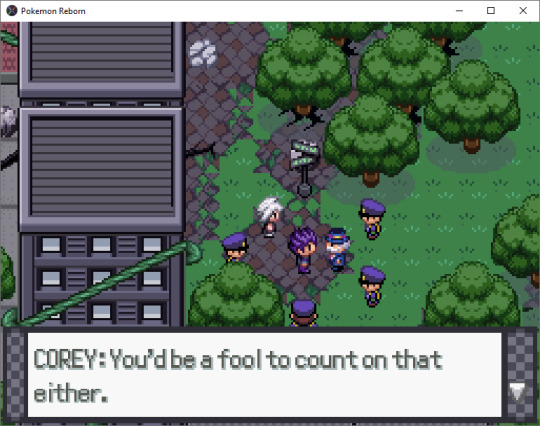
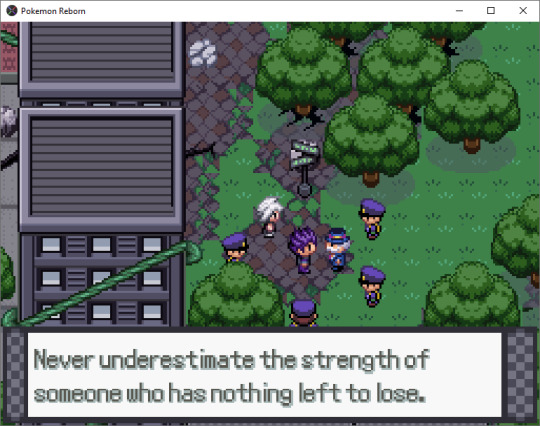
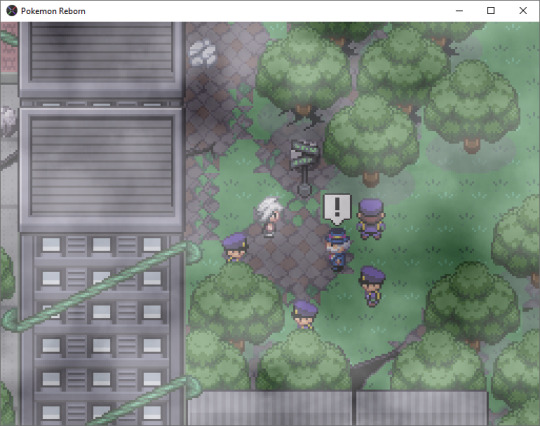
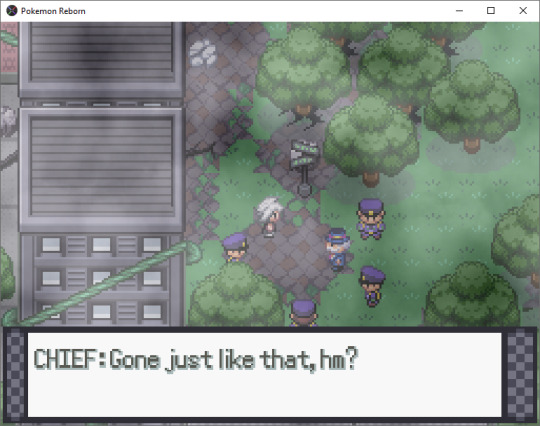
A smokescreen? So it was Corey who trained Team Meteor’s ninja division all along too! When will the deception and betrayal end!?
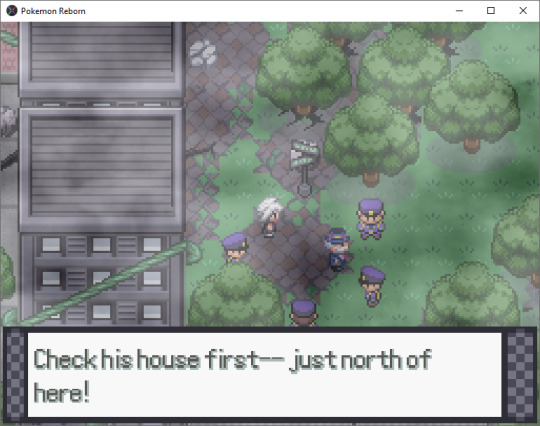
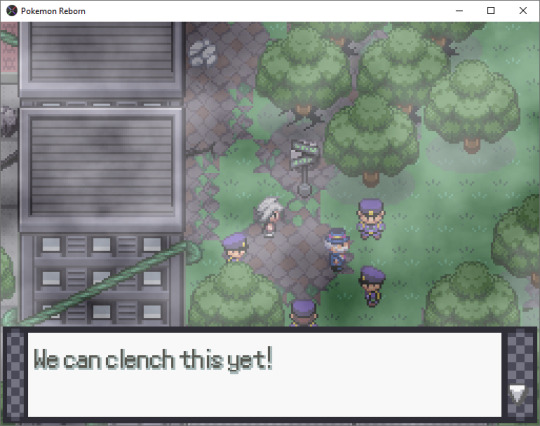
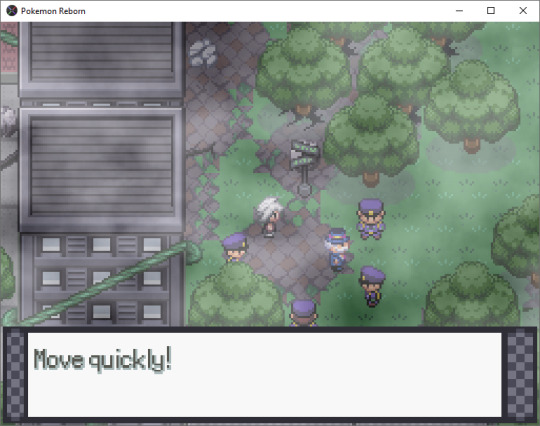
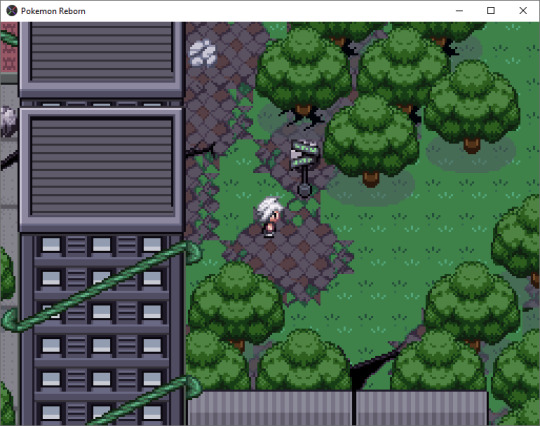
Okay…wow. There is…so much to unpack with all of this. Can these street signs give me any salvation?
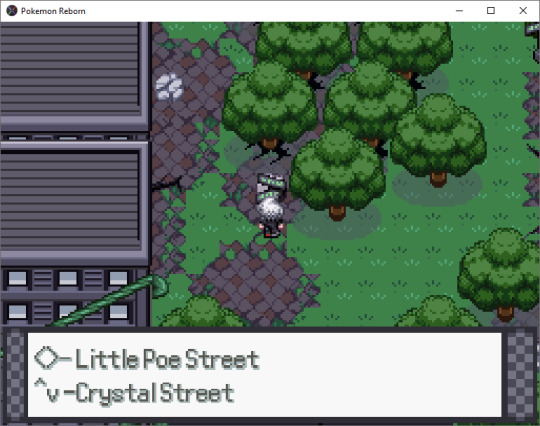
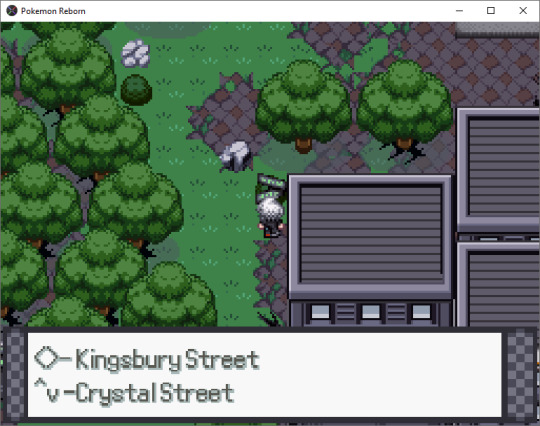
Not in the slightest. :(
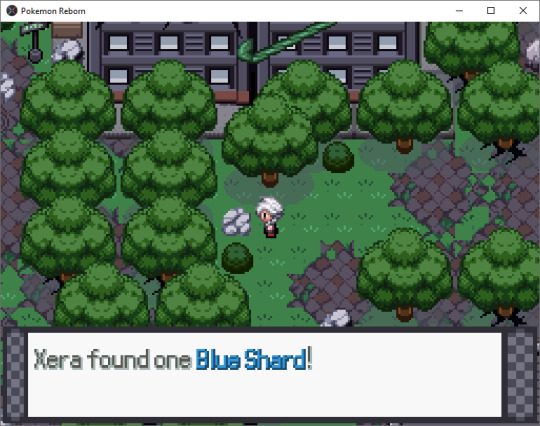
Oh yeah, this is exactly what I needed, even more Shards, I love this city so much-
Though, actually…it looks like we’re really getting into the meat of Beryl Ward, here. The streets aren’t as terrible, the buildings are kinda in one piece, the Starly are back, I see a Poké Mart, and another sign-
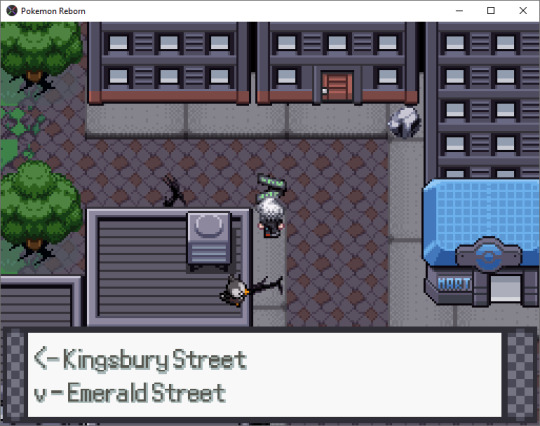
Still nothing new, but good to have.
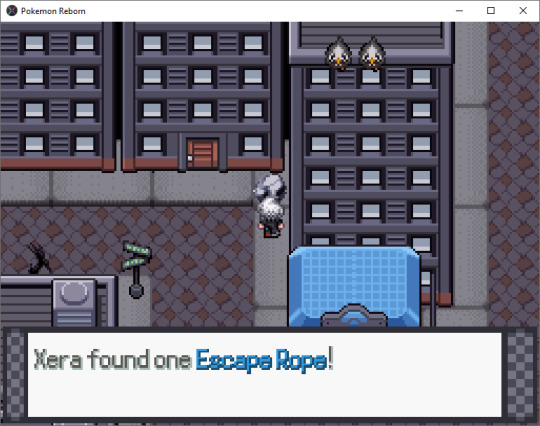
And that’s even better to have! Yes, I do want to escape from all of this, what a considerate rock.
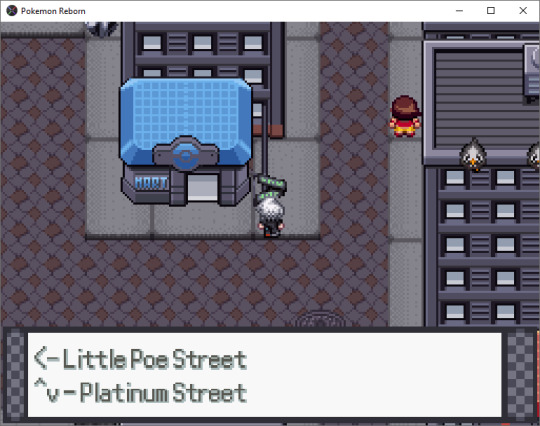
Still nothing, but at least there are some new NPCs to talk to, and luckily none of them force Xera into a battle. I’ll talk to them later- there’s a much-needed and very welcome Pokémon Center to focus on instead.

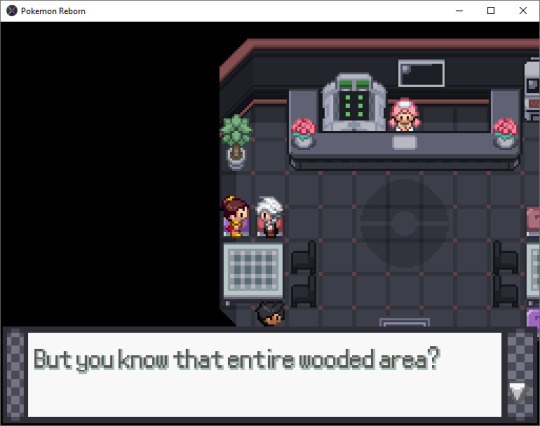

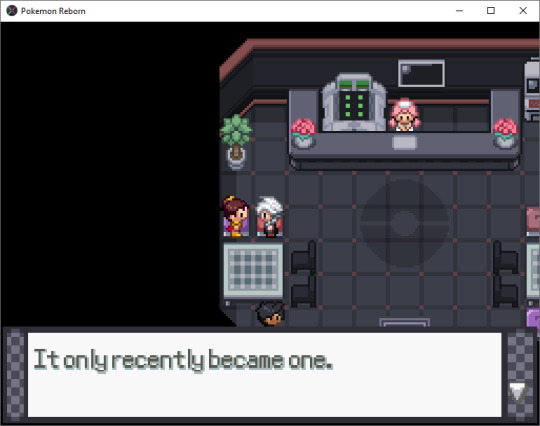
It…did? Wow, they weren’t kidding when they said they didn’t catch the PULSE as early as they did in Obsidia- how long was that Tangrowth left to germinate??
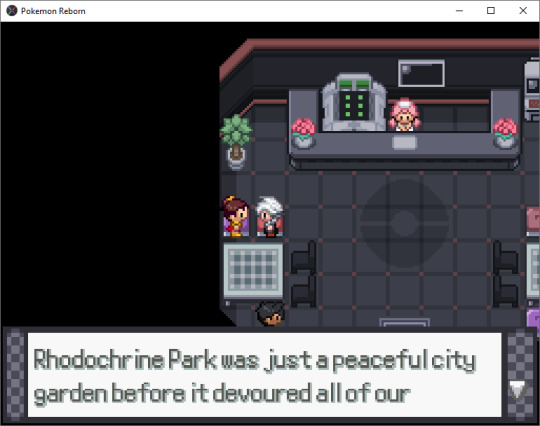
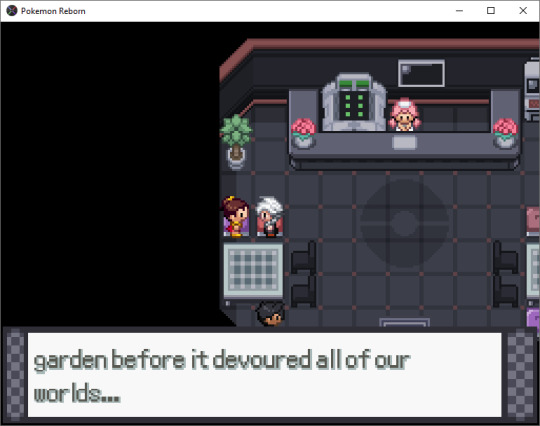
I guess that explains why there were so many abandoned buildings and street tiles scattered about. So was that all once a part of Beryl Ward? Goodness me…
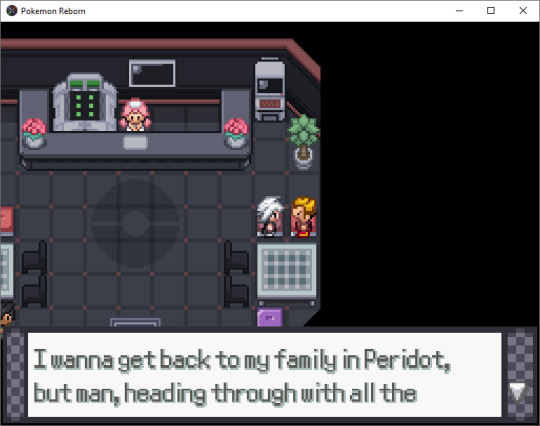
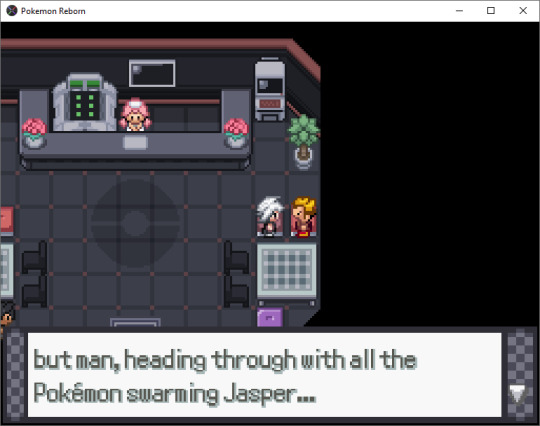
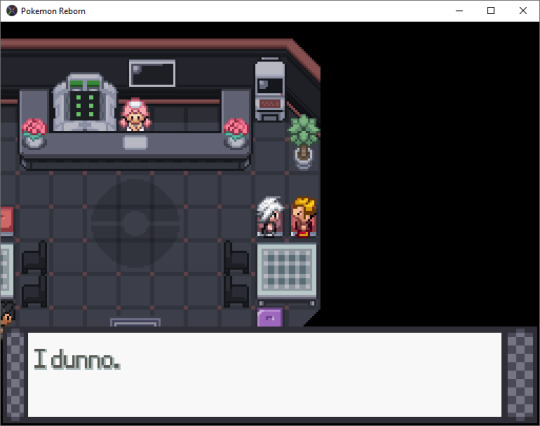
Still sucks that there are still wild Pokémon running around in Jasper Ward, but I guess that place won’t get fixed as quickly as Obsidia Park was, alas.
By the way, that girl in the bottom just gives the “easyhms” password (in waaaaay too many text boxes), but we’ve already used it so it’s no big deal.

Instead, I’m gonna end the chapter off here! Seems like a pretty perfect place to stop- not like there’s gonna be a shortage of things to do next play session, surely.
Thanks everyone for the patience as well as reading this latest chapter- it sure was a doozy, and I’m sure the plot will thicken even more next time! I’m not ready for anything that could happen, but I’ve already committed and we’re 16 chapters in so it’s too late to run away from the consequences now!
So next time, we’ll see what this section of Beryl Ward has going for it and…quite possibly, face off against Borealis/Corey for real. Again, very much not ready, but there’s no choice but to press onward. Pray for my emotional health come next chapter, I have some baaaad feelings about where things are headed from here on.
CURRENT TEAM:
Riptide
Species: Croconaw
Gender: Male
Level: 27
Ability: Sheer Force*
Item: Quick Claw
Brave nature; Alert to sounds.
Glare
Species: Arbok
Gender: Female
Level: 27
Ability: Intimidate
Item: Protective Pads
Naughty nature; Highly curious.
Prong
Species: Charjabug
Gender: Female
Level: 27
Ability: Battery
Item: None
Rash nature; Loves to eat.
Decibel
Species: Noibat
Gender: Female
Level: 27
Ability: Telepathy*
Item: None
Bashful nature; Often lost in thought.
Blizzard
Species: Snover
Gender: Male
Level: 27
Ability: Snow Warning
Item: None
Naive nature; Likes to thrash about.
Crater
Species: Numel
Gender: Female
Level: 28
Ability: Oblivious
Item: Quick Claw
Hardy nature; Often scatters things.
CURRENT BOXES:
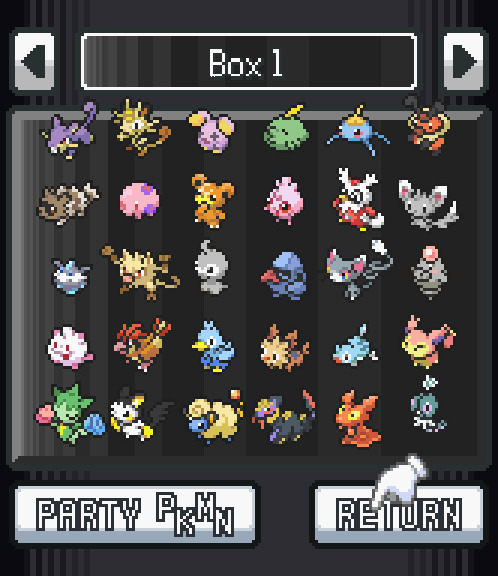
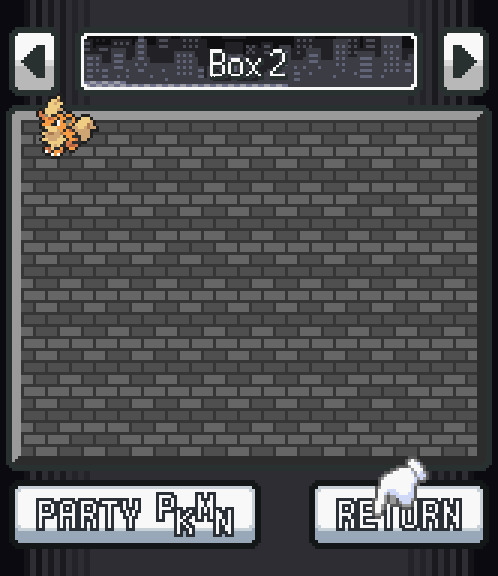
NUMBER OF RELOADS: 8
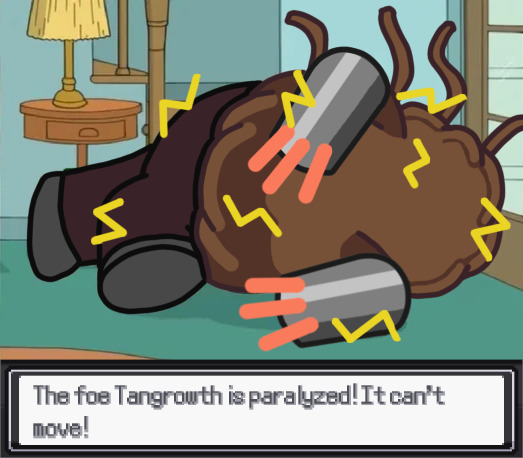
Previous
Next
Back to index
5 notes
·
View notes
Note
I have a question for you. I'm doing research on historical pregnancy tests, and the pissing on barley test was mentioned for Egypt. Is this correct? Which papyri is this found in? Thank you!
Yes! There are a few papyri that contain/mention pregnancy tests, actually. One of them is Pap. Carlsberg 8, but that one is very lacunose, another is the Berlin Medical Papyrus.
Here’s the excerpt from that one, also known as Papyrus Berlin 3038, as translated by Dawson:
Another test for a woman who will bear or a woman who will not bear. Wheat and spelt: let the woman water them daily with her urine like dates and like sh'at seeds in two bags. If they both grow, she will bear: if the wheat grows, it will be a boy; if the spelt grows, it will be a girl. If neither grows, she will not bear.
The test is a general pregnancy test and in some cases like the above, also a gender-prediction test. The hopefully-pregnant woman is supposed to urinate on bags of two different grains, and if both or either sprouted, the woman was pregnant. The gender of the child was thought to be indicated by the type of grain that sprouted faster than the other. If neither grain sprouted, the woman was supposedly not pregnant.
Now the interpretations of how the grains mentioned in the papyrus should be translated differ. In the excerpt above, Dawson mentions wheat and spelt. Other versions translate the terms as emmer (girl) and barley (boy). The 10th century text Kamel-el-Sinaafil Tibb includes what seems to be a variant of this test, which mentions barley, wheat (and beans). This text doesn’t mention anything about gender-prediction, however.
There have been a few different studies on the efficacy of this test. In 1963, Paul Ghalioungui spearheaded the first one. The grains chosen for this study were wheat and barley. You can read the paper about this study here; but to make an interesting story short: in 23 of 40 cases involving pregnant urine the grain sprouted in a way that approximated control, and in another 5 of those 40 cases the growth was poorer than control, but definitely there. In 12 cases there was no growth. In 23 cases one grain grew faster than the other: in 7 cases the prediction of gender as suggested by the papyrus was correct; in the other 16 it was incorrect. There was a 100% failure to grow in the grains watered with the urine of non-pregnant individuals, both male and female.
The study does mention that they kept the seeds on filter paper and not in a mixture of sand and dates, as the Egyptian test mentions is necessary. There is also still the possibility that the wheat and barley are not the correct types of grain. So this should be taken into consideration while discussing the results of this study, although these are still seriously interesting! One of the conclusions is that it’s possible that the hormones estrogen and progesterone, present in high quantities in pregnant women, help in germination of the grains.
#still mad I was nauseous for 22 weeks straight when i was finally pregnant and couldn't piss on anything without also needing to throw up#egyptology#ancient egypt#ancient egyptian medicine#pregnancy test#you activated my trap card so you get more than you asked for
85 notes
·
View notes
Text
The BBC estimates that most people will only read 6 books out of the 100 listed below. Reblog this and bold the titles you’ve read.
1. Pride and prejudice - Jane Austen
2. Lord of the Rings - J.R.R. Tolkien
3. Jane Eyre - Charlotte Brontë
4. Harry Potter series
5. To kill a Mockingbird - Harper Lee
6. The Bible
7. Wuthering heights - Emily Brontë (TBR)
8. Nineteen Eighty Four - George Orwell
9. His dark material - Philip Pullman
10. Great Expectations - Charles Dickens
11. Little Women - Louisa M. Alcott
12. Tess of the d'Urbervilles - Thomas Hardy
13. Catch 22 - Joseph Heller (DNF)
14. Complete works of Shakespeare (TBR)
15. Rebecca - Daphne Du Maurier
16. The Hobbit - J.R.R. Tolkien
17. Birdsong - Sebastian Faulks
18. Catcher in the Rye
19. The Time Traveller's Wife - Audrey Niffeneger
20. Middlemarch - George Eliot
21. Gone with the Wind - Margaret Mitchell
22. The Great Gatsby - F. Scott Fitzgerald
23. Bleak House - Charles Dickens
24. War and Peace - Leo Tolstoy
25. The Hitchhiker's Guide to the Galaxy - Douglas Adams
26. Brideshead revisited - Evelyn Waugh
27. Crime and Punishment - Fyodor Dostoevsky
28. Grapes of Wrath - John Steinbeck
29. Alice in Wonderland - Lewis Carroll
30. The Wind in the Willows - Kenneth Grahame
31. Anna Karenina - Leo Tolstoy
32. David Copperfield - Charles Dickens
33. Chronicles of Narnia - C.S. Lewis
34. Emma - Jane Austen
35. Persuasion - Jane Austen
36. The Lion, the Witch and the Wardrobe - C.S. Lewis
37. The Kite Runner - Khaled Hosseini
38. Captain Corelli's Mandolin - Louis de Bernieres
39. Memoirs of a Geisha - Arthur Golden
40. Winnie the Pooh - AA Milne
41. Animal Farm - George Orwell
42. The Da Vinci Code - Dan Brown (DNF)
43. One Hundred Years of Solitude - Gabriel Garcia Marquez
44. A Prayer for Owen Meaney - John Irving
45. The Woman in White - Wilkie Collins
46. Anne of Green Gables - LM Montgomery
47. Far from the Madding Crowd - Thomas Hardy (TBR)
48. The Handmaid's Tale - Margaret Atwood
49. Lord of the Flies - William Golding (TBR)
50. Atonement - Ian McEwan
51. Life of Pi - Yan Martel
52. Dune - Frank Herbert
53. Cold Comfort Farm - Stella Gibbons
54. Sense and Sensibility - Jane Austen
55. A Suitable Boy - Vikram Seth
56. The Shadow of the Wind - Carlos Ruiz Zafon
57. A Tale of Two Cities - Charles Dickens (DNF)
58. Brave New World - Aldous Huxley (TBR)
59. The Curious Incident of the Dog in the Night -time - Mark Haddon
60. Love in the Time of Cholera - Gabriel Garcia Marquez
61. Of Mice and Men - John Steinbeck
62. Lolita - Vladimir Nabokov
63. The Secret History - Donna Tartt (TBR)
64. The Lovely Bones - Alice Sebold
65. Count of Monte Cristo - Alexandre Dumas (DNF)
66. On the Road - Jack Kerouac
67. Jude the Obscure - Thomas Hardy
68. Bridget Jones' Diary - Helen Fielding
69. Midnight's Children - Salman Rushdie
70. Moby Dick - Herman Melville (DNF)
71. Oliver Twist - Charles Dickens
72. Dracula - Bram Stoker
73. The Secret Garden - Frances Hodgson Burnett
74. Notes from a Small Island - Bill Bryson
75. Ulysses - James Joyce
76. The Bell Jar - Sylvia Plath
77. Swallows and Amazons - Arthur Ransome
78. Germinal - Emile Zola
79. Vanity Fair - William Makepeace Thackeray
80. Possession - AS Byatt
81. A Christmas Carol - Charles Dickens
82. Cloud Atlas - David Mitchell
83. The Colour Purple - Alice Walker (TBR)
84. The Remains of the Day - Kazuo Ishiguro (TBR)
85. Madame Bovary - Gustave Flaubert
86. A Fine Balance - Rohinton Mistry
87. Charlotte's Web - EB White
88. The Five People You meet in Heaven - Mitch Albom
89. Adventures of Sherlock Holmes - Sir Arthur Conan Doyle
90. The Faraway Tree Collection - Enid Blyton
91. Heart of Darkness - Joseph Conrad
92. The Little Prince - Antoine De Saint-Exupery
93. The Wasp Factory - Iain Banks
94. Watership Down - Richard Adams
95. A Confederacy of Dunces - John Kennedy Toole
96. A Town Like Alice - Nevil Shute
97. The Three Musketeers - Alexandre Dumas
98. Hamlet - William Shakespeare
99. Charlie and the Chocolate Factory - Roald Dahl
100. Les Miserables - Victor Hugo (DNF)
31 notes
·
View notes
Text
I'm bad at growing things from seed. I have more failed gardens than successful ones. But I'm also stubborn and this year was having some success on the seed front.
And then I decided I wanted elderberry bushes. Apparently all you have to do to grow elderberries from cuttings is stick them in water. But I, in my hubris, bought seeds. Apparently elderberry seeds require a damn ritual.
But I have the seeds, so I guess I'm doing the ritual. Anyway, it's because elderberry seeds have a really tough outer shell, and they don't germinate unless you replicate the weather conditions they'd naturally experience. For seven'ish months.
Something, something, folk magic.
It's not even put them in dirt and wait. Oh no. It's lay them out in a ziplock in a moist, curated soil mixture and keep them at room temperature, in the dark, for 10-12 weeks. Like tiny vampires that need the dirt of their home country to rest. Or you can use a moist paper towel, and still keep them in the warm dark like the tiny monsters they are.
And then comes the Winter. They need to go into the fridge for another 14-16 weeks to simulate winter and finally, maybe germinate. Then I can plant them and do all the usual seedling things.
It's a nice rainy day, so I'm going to start the Elderberry Ritual tonight, hopefully.
2 notes
·
View notes
Text
How many have you read?
The BBC estimates that most people will only read 6 books out of the 100 listed below. Reblog this and bold the titles you’ve read.
1 Pride and Prejudice - Jane Austen
2 Lord of the Rings - J. R. R. Tolkein
3 Jane Eyre – Charlotte Bronte
4 Harry Potter series
5 To Kill a Mockingbird - Harper Lee
6 The Bible
7 Wuthering Heights – Emily Bronte
8 Nineteen Eighty Four – George Orwell
9 His Dark Materials – Philip Pullman
10 Great Expectations – Charles Dickens
11 Little Women – Louisa May Alcott
12 Tess of the D’Urbervilles – Thomas Hardy
13 Catch 22 – Joseph Heller
14 Complete Works of Shakespeare
15 Rebecca – Daphne Du Maurier
16 The Hobbit – JRR Tolkien
17 Birdsong – Sebastian Faulks
18 Catcher in the Rye
19 The Time Traveller’s Wife - Audrey Niffeneger
20 Middlemarch – George Eliot
21 Gone With The Wind – Margaret Mitchell
22 The Great Gatsby – F Scott Fitzgerald
23 Bleak House – Charles Dickens
24 War and Peace – Leo Tolstoy
25 The Hitch Hiker’s Guide to the Galaxy – Douglas Adams
26 Brideshead Revisited – Evelyn Waugh
27 Crime and Punishment – Fyodor Dostoyevsky
28 Grapes of Wrath – John Steinbeck
29 Alice in Wonderland – Lewis Carroll
30 The Wind in the Willows – Kenneth Grahame
31 Anna Karenina – Leo Tolstoy
32 David Copperfield – Charles Dickens
33 Chronicles of Narnia – CS Lewis
34 Emma – Jane Austen
35 Persuasion – Jane Austen
36 The Lion, The Witch and The Wardrobe – CS Lewis
37 The Kite Runner - Khaled Hosseini
38 Captain Corelli’s Mandolin - Louis De Bernieres
39 Memoirs of a Geisha – Arthur Golden
40 Winnie the Pooh – AA Milne
41 Animal Farm – George Orwell
42 The Da Vinci Code – Dan Brown
43 One Hundred Years of Solitude – Gabriel Garcia Marquez
44 A Prayer for Owen Meaney – John Irving
45 The Woman in White – Wilkie Collins
46 Anne of Green Gables – LM Montgomery
47 Far From The Madding Crowd – Thomas Hardy
48 The Handmaid’s Tale – Margaret Atwood
49 Lord of the Flies – William Golding
50 Atonement – Ian McEwan
51 Life of Pi – Yann Martel
52 Dune – Frank Herbert
53 Cold Comfort Farm – Stella Gibbons
54 Sense and Sensibility – Jane Austen
55 A Suitable Boy – Vikram Seth
56 The Shadow of the Wind – Carlos Ruiz Zafon
57 A Tale Of Two Cities – Charles Dickens
58 Brave New World – Aldous Huxley
59 The Curious Incident of the Dog in the Night-time – Mark Haddon
60 Love In The Time Of Cholera – Gabriel Garcia Marquez
61 Of Mice and Men – John Steinbeck
62 Lolita – Vladimir Nabokov
63 The Secret History – Donna Tartt
64 The Lovely Bones - Alice Sebold
65 Count of Monte Cristo – Alexandre Dumas
66 On The Road – Jack Kerouac
67 Jude the Obscure – Thomas Hardy
68 Bridget Jones’s Diary – Helen Fielding
69 Midnight’s Children – Salman Rushdie
70 Moby Dick – Herman Melville
71 Oliver Twist – Charles Dickens
72 Dracula – Bram Stoker
73 The Secret Garden – Frances Hodgson Burnett
74 Notes From A Small Island – Bill Bryson
75 Ulysses – James Joyce
76 The Bell Jar – Sylvia Plath
77 Swallows and Amazons - Arthur Ransome
78 Germinal – Emile Zola
79 Vanity Fair – William Makepeace Thackeray
80 Possession – AS Byatt
81 A Christmas Carol – Charles Dickens
82 Cloud Atlas – David Mitchel
83 The Color Purple – Alice Walker
84 The Remains of the Day – Kazuo Ishiguro
85 Madame Bovary – Gustave Flaubert
86 A Fine Balance – Rohinton Mistry
87 Charlotte’s Web – EB White
88 The Five People You Meet In Heaven – Mitch Albom
89 Adventures of Sherlock Holmes – Sir Arthur Conan Doyle
90 The Faraway Tree Collection – Enid Blyton
91 Heart of Darkness – Joseph Conrad
92 The Little Prince – Antoine De Saint-Exupery
93 The Wasp Factory – Iain Banks
94 Watership Down – Richard Adams
95 A Confederacy of Dunces – John Kennedy Toole
96 A Town Like Alice – Nevil Shute
97 The Three Musketeers – Alexandre Dumas
98 Hamlet – William Shakespeare
99 Charlie and the Chocolate Factory – Roald Dahl
100 Les Miserables – Victor Hugo
34 in completion, 47 if you count the ones I started and didn't finish
original post
#this kind of feels like a nyt bestseller list a little bit#A Tree Grows in Brooklyn isn't even on here#also the complete works of shakespeare is on here and then hamlet why#also the chronicles of narnia and then the lion the witch and the wardrobe#i don't understand#books#reading
12 notes
·
View notes
Text
Sextidi 16 Germinal an CCXXXII
(Jeudi 4 avril 2024 / Thursday, April 4th, 2024)
🇨🇵 Texte en français et en anglais / Text in French and English 🇬🇧/🇺🇲

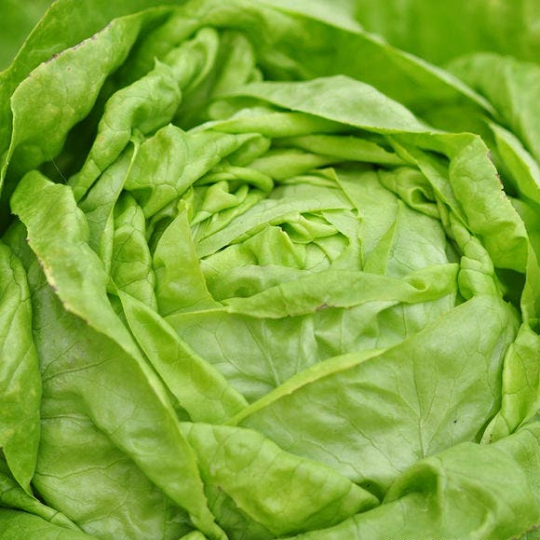
Le calendrier républicain, adopté pendant la Révolution française, était une tentative de rompre avec le passé monarchique et catholique en instaurant un système de mesure du temps basé sur les valeurs républicaines et agricoles. Chaque jour du calendrier républicain était dédié à une plante, un animal, un outil ou un événement symbolique, reflétant ainsi les idéaux de la Révolution.
Le mois de Germinal dans le calendrier républicain français représente le renouveau et la vitalité de la nature au printemps. Du 20 mars au 19 avril, Germinal est le mois où la terre se réveille de son sommeil hivernal, où les bourgeons éclosent et où les premières fleurs colorent les paysages. Il incarne le début de la saison des semailles et le travail de la terre, symbolisant ainsi l'espoir et la promesse d'une nouvelle récolte. Germinal rappelle également les idéaux républicains de liberté, d'égalité et de fraternité, en invitant chacun à contribuer à l'essor de la société et à cultiver un avenir meilleur.
Aujourd'hui, dans le calendrier républicain français, nous célébrons la journée de la Laitue. Ce jour est dédié à mettre en lumière l'importance de la laitue, une plante à feuilles vertes largement cultivée et appréciée pour ses qualités nutritionnelles et gustatives.
La laitue (Lactuca sativa) est une plante herbacée de la famille des Astéracées. Reconnaissable par ses feuilles vertes, croquantes et juteuses, la laitue est un ingrédient essentiel dans de nombreuses cuisines à travers le monde. Cultivée depuis l'Antiquité, elle est appréciée pour sa fraîcheur et sa polyvalence culinaire.
La laitue est non seulement délicieuse, mais elle est également riche en nutriments essentiels. Elle est une excellente source de vitamines et de minéraux, tels que la vitamine K, la vitamine A, le folate et le potassium. De plus, elle est faible en calories et riche en fibres, ce qui en fait un aliment idéal pour soutenir une alimentation saine et équilibrée.
En cette journée spéciale de la Laitue, nous sommes invités à célébrer ce légume frais et nutritif. C'est également une occasion parfaite pour en apprendre davantage sur les différentes variétés de laitue, leurs méthodes de culture et leurs bienfaits pour la santé.
En conclusion, la journée de la Laitue le 16 Germinal est une occasion idéale pour apprécier ce légume délicieux et nourrissant. Profitez de cette journée pour explorer les merveilles de la laitue et pour partager vos découvertes avec vos proches.
***
The Republican calendar, adopted during the French Revolution, was an attempt to break away from the monarchic and Catholic past by establishing a system of time measurement based on republican and agricultural values. Each day of the Republican calendar was dedicated to a plant, an animal, a tool, or a symbolic event, thus reflecting the ideals of the Revolution.
The month of Germinal in the French Republican calendar represents the renewal and vitality of nature in spring. From March 20 to April 19, Germinal is the month when the earth awakens from its winter slumber, when buds burst open, and the first flowers color the landscapes. It embodies the beginning of the sowing season and the work of the land, symbolizing hope and the promise of a new harvest. Germinal also recalls the republican ideals of liberty, equality, and fraternity, inviting everyone to contribute to the advancement of society and cultivate a better future.
Today, in the French republican calendar, we celebrate Lettuce Day, marked on 16 Germinal. This day is dedicated to highlighting the importance of lettuce, a green leafy plant widely cultivated and appreciated for its nutritional and gustatory qualities.
Lettuce (Lactuca sativa) is a herbaceous plant of the Asteraceae family. Recognizable by its green, crunchy, and juicy leaves, lettuce is an essential ingredient in many cuisines around the world. Cultivated since antiquity, it is appreciated for its freshness and culinary versatility.
Lettuce is not only delicious but also rich in essential nutrients. It is an excellent source of vitamins and minerals, such as vitamin K, vitamin A, folate, and potassium. Furthermore, it is low in calories and rich in fiber, making it an ideal food to support a healthy and balanced diet.
On this special Lettuce Day, we are invited to celebrate this fresh and nutritious vegetable. It is also a perfect opportunity to learn more about the different varieties of lettuce, their cultivation methods, and their health benefits.
In conclusion, Lettuce Day on 16 Germinal is an ideal opportunity to appreciate this delicious and nourishing vegetable. Enjoy this day to explore the wonders of lettuce and share your discoveries with your loved ones.
#calendrier#calendrier républicain#calendrier républicain français#calendrier révolutionnaire#calendrier révolutionnaire français#france#français#révolution#french revolution#french#révolution française#francais#french calendar#laitue#lettuce#agriculture#nature#germinal
2 notes
·
View notes